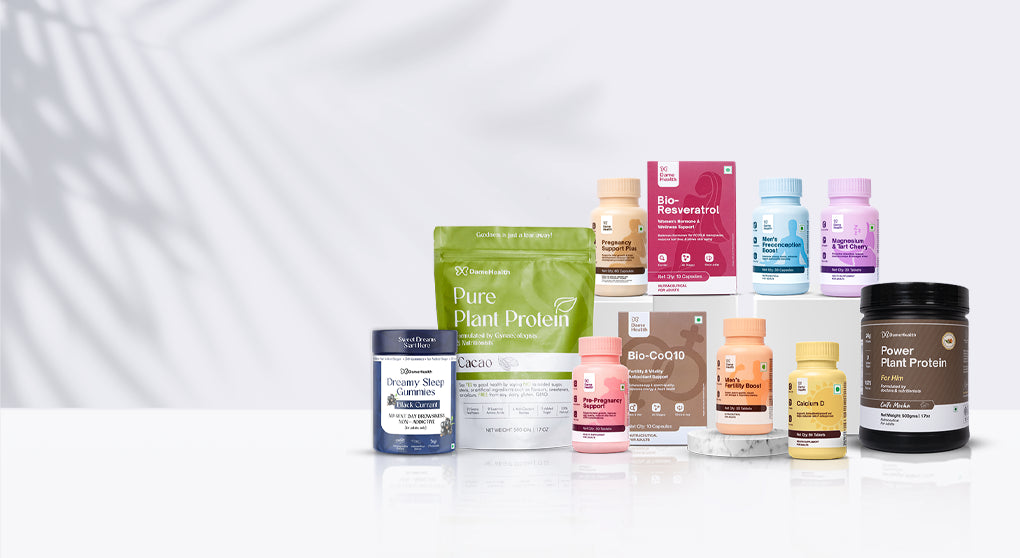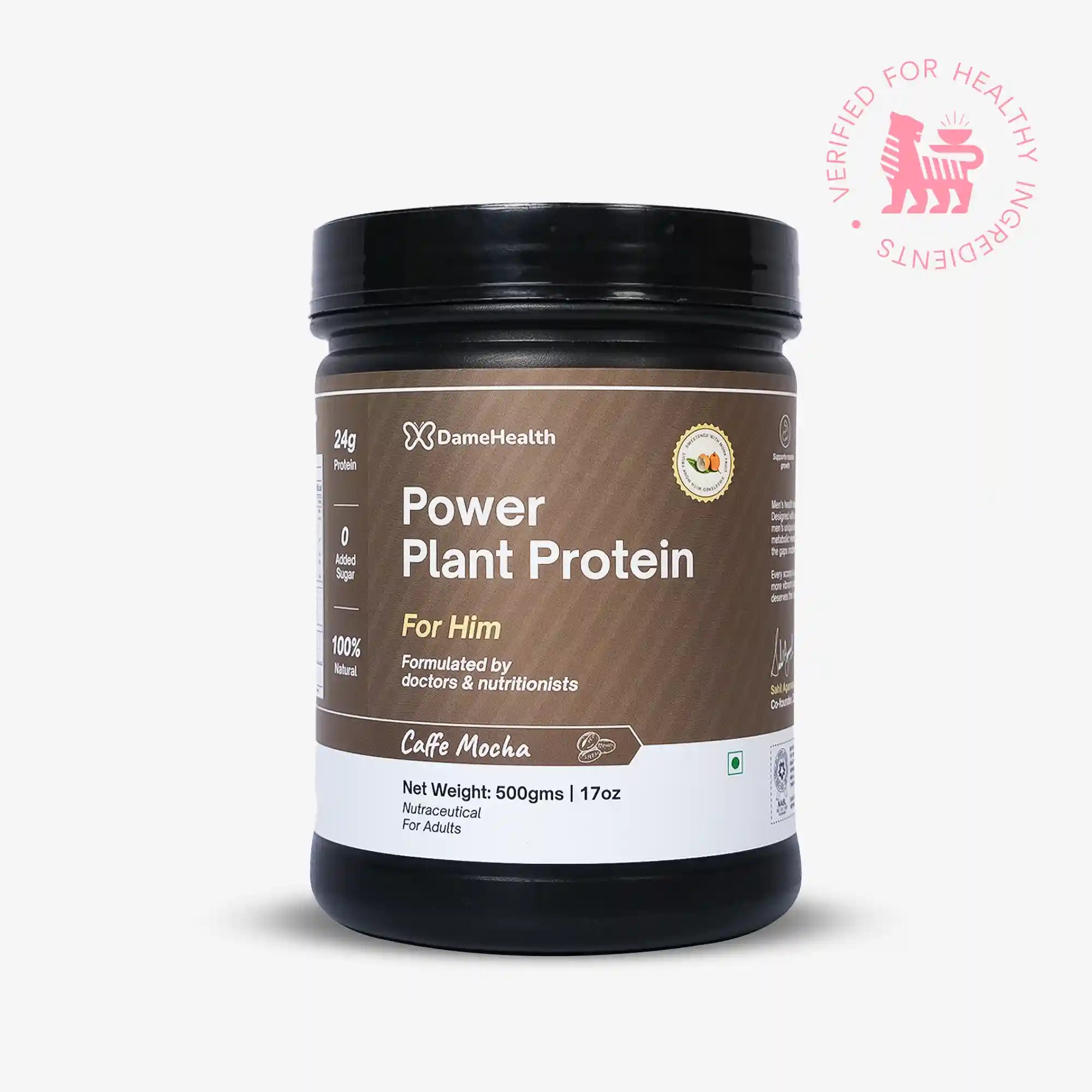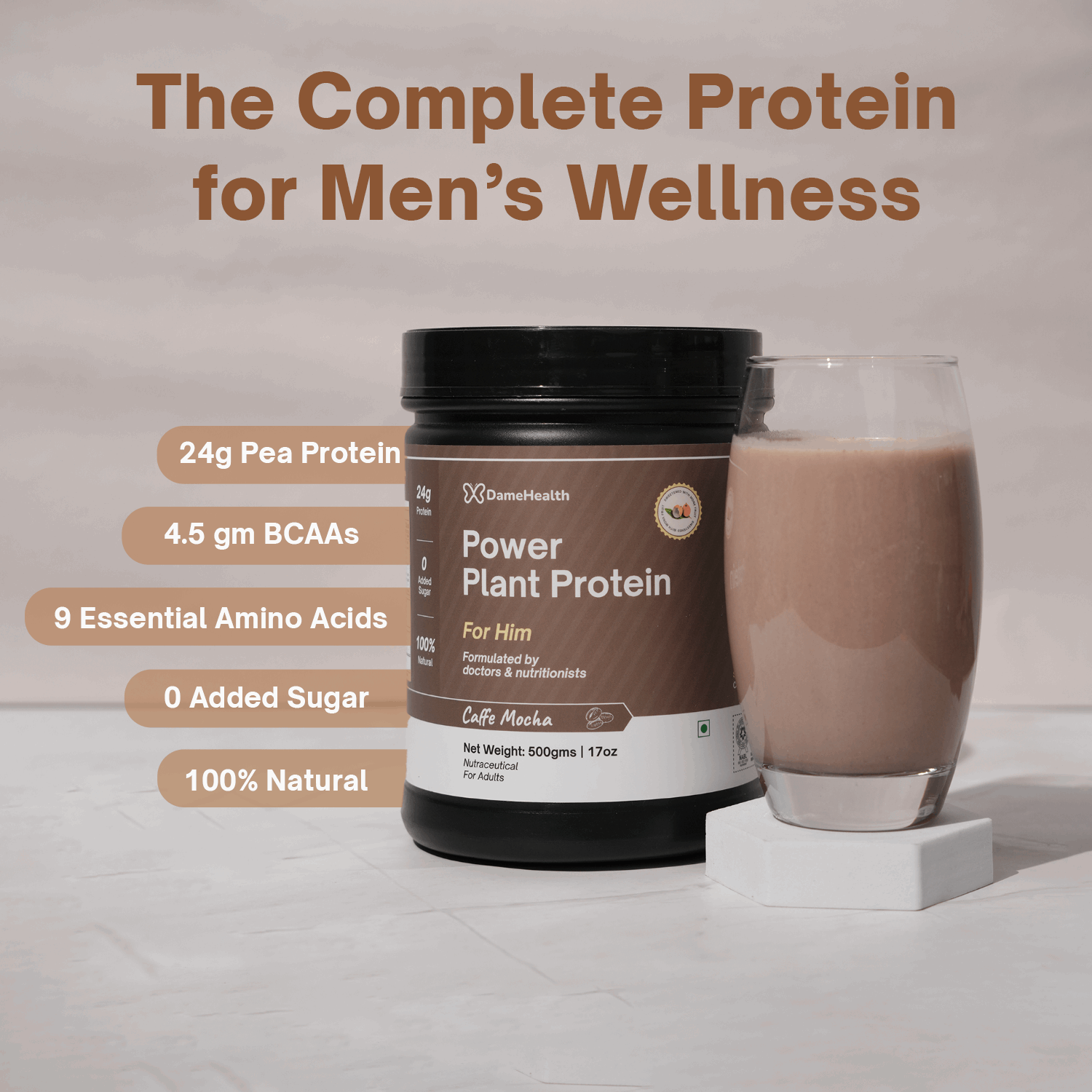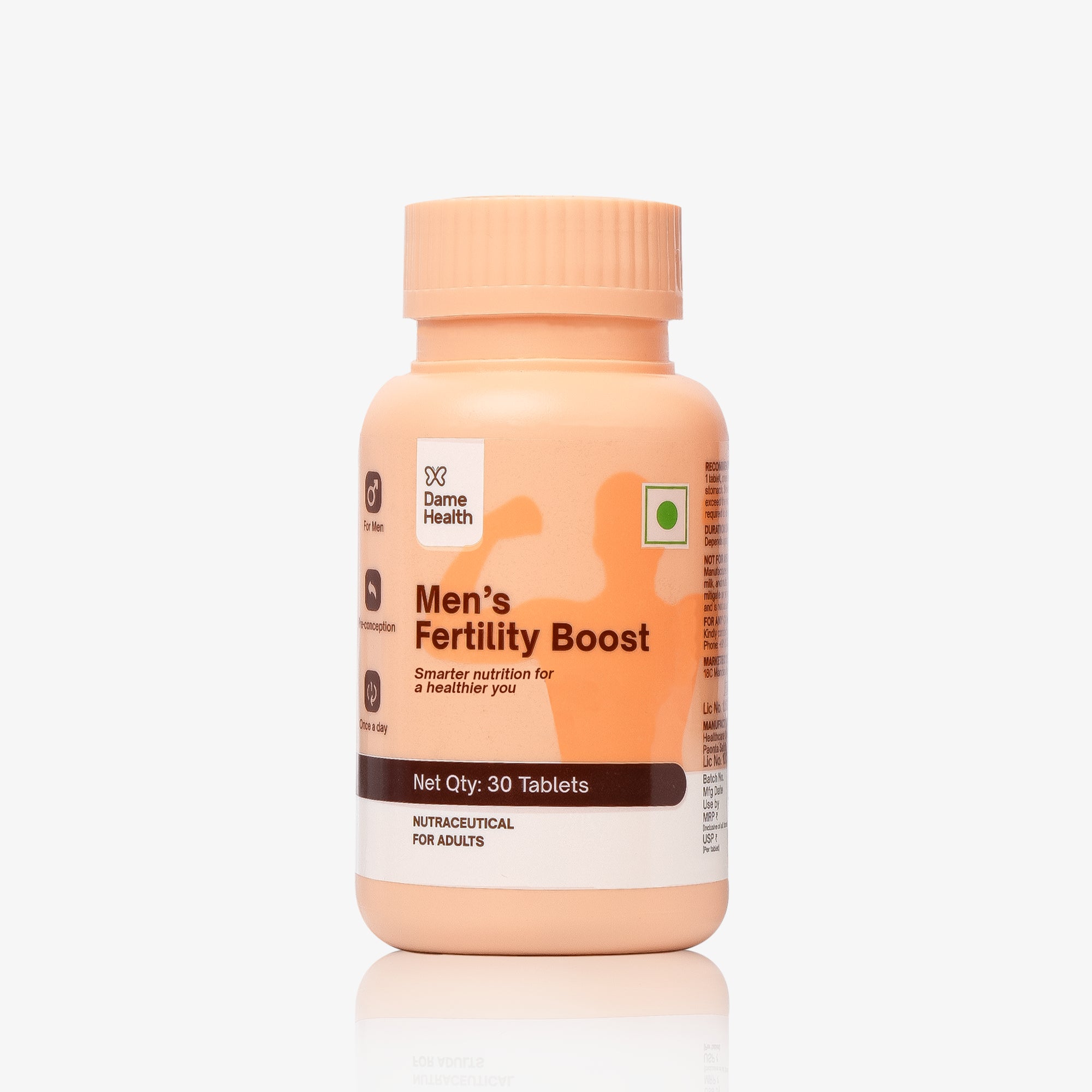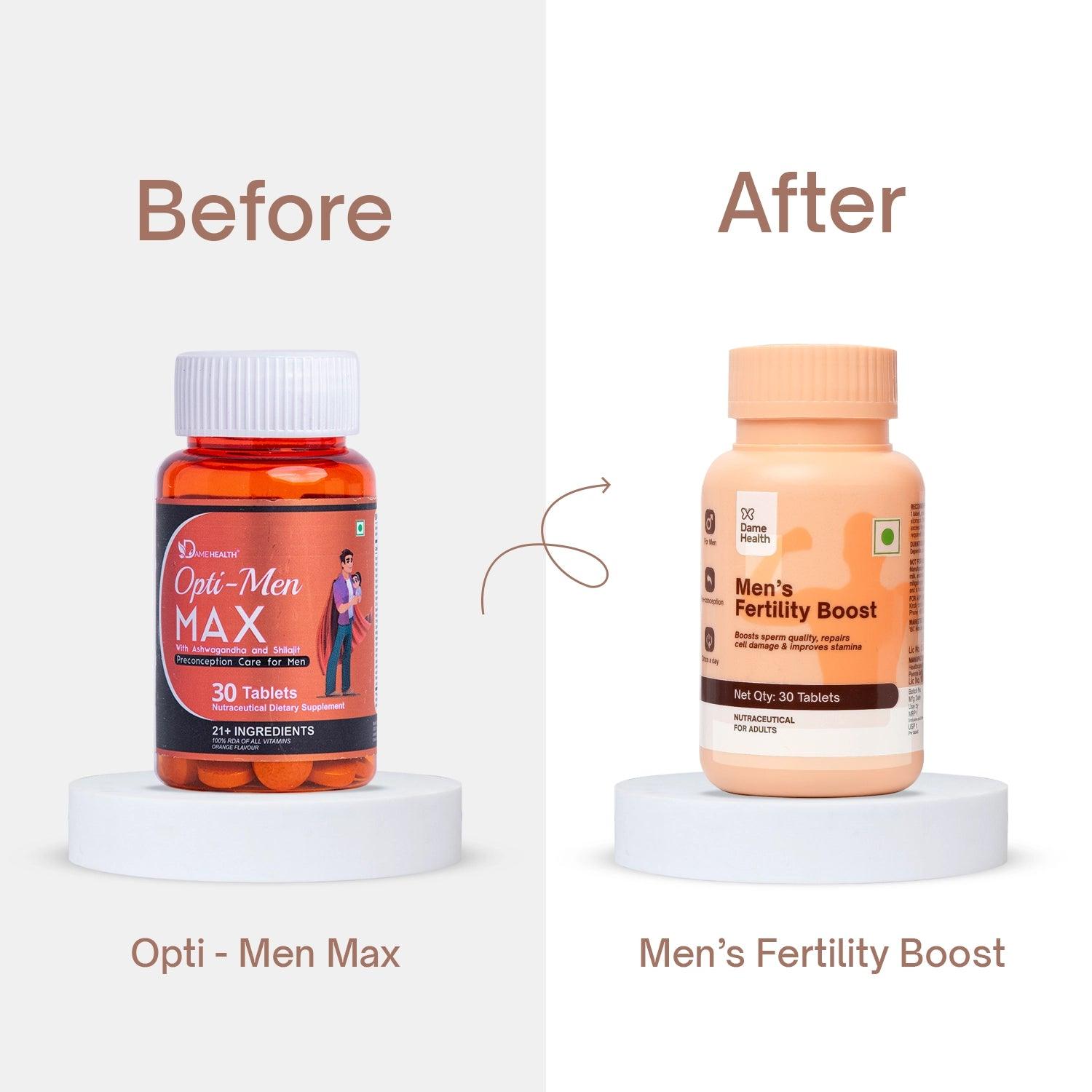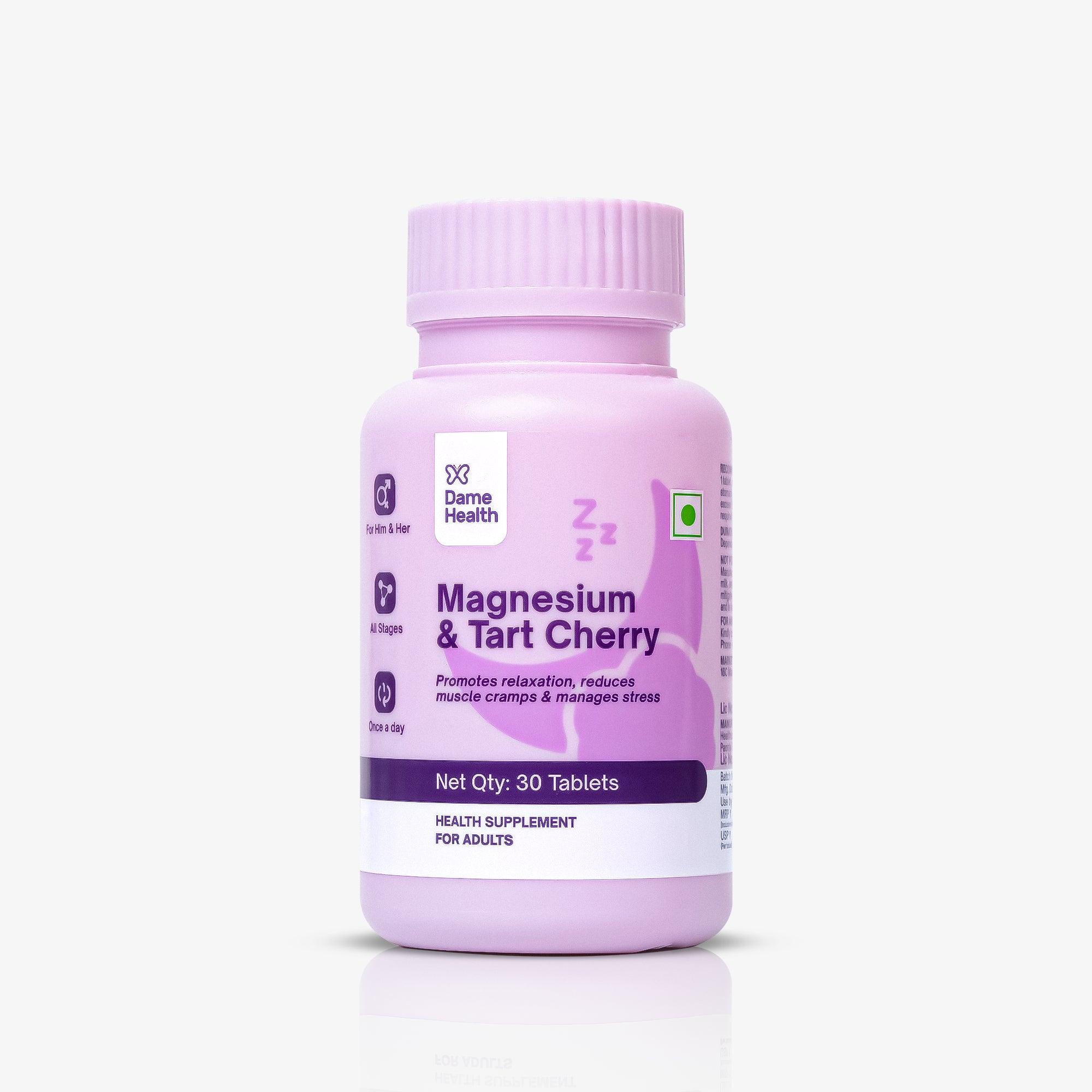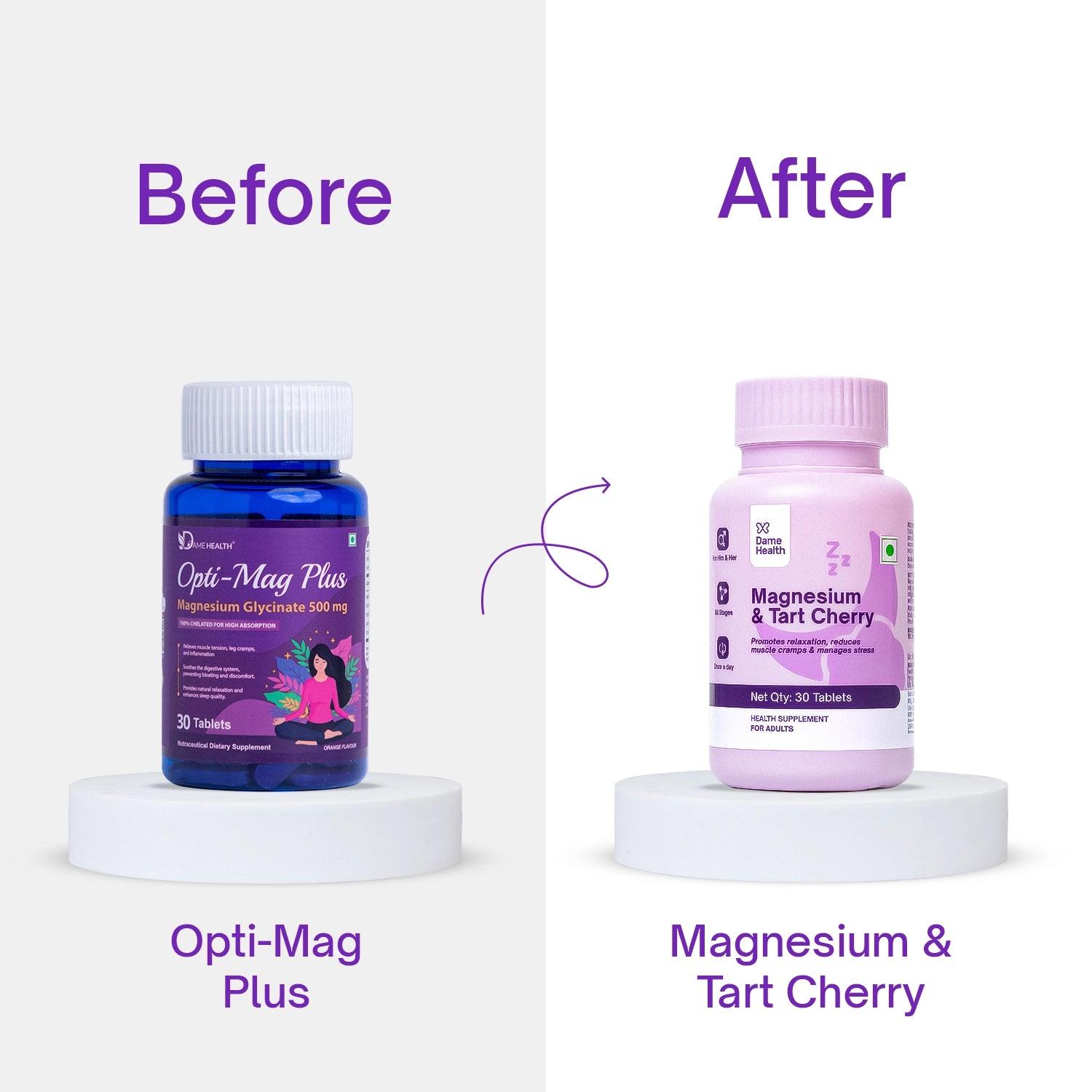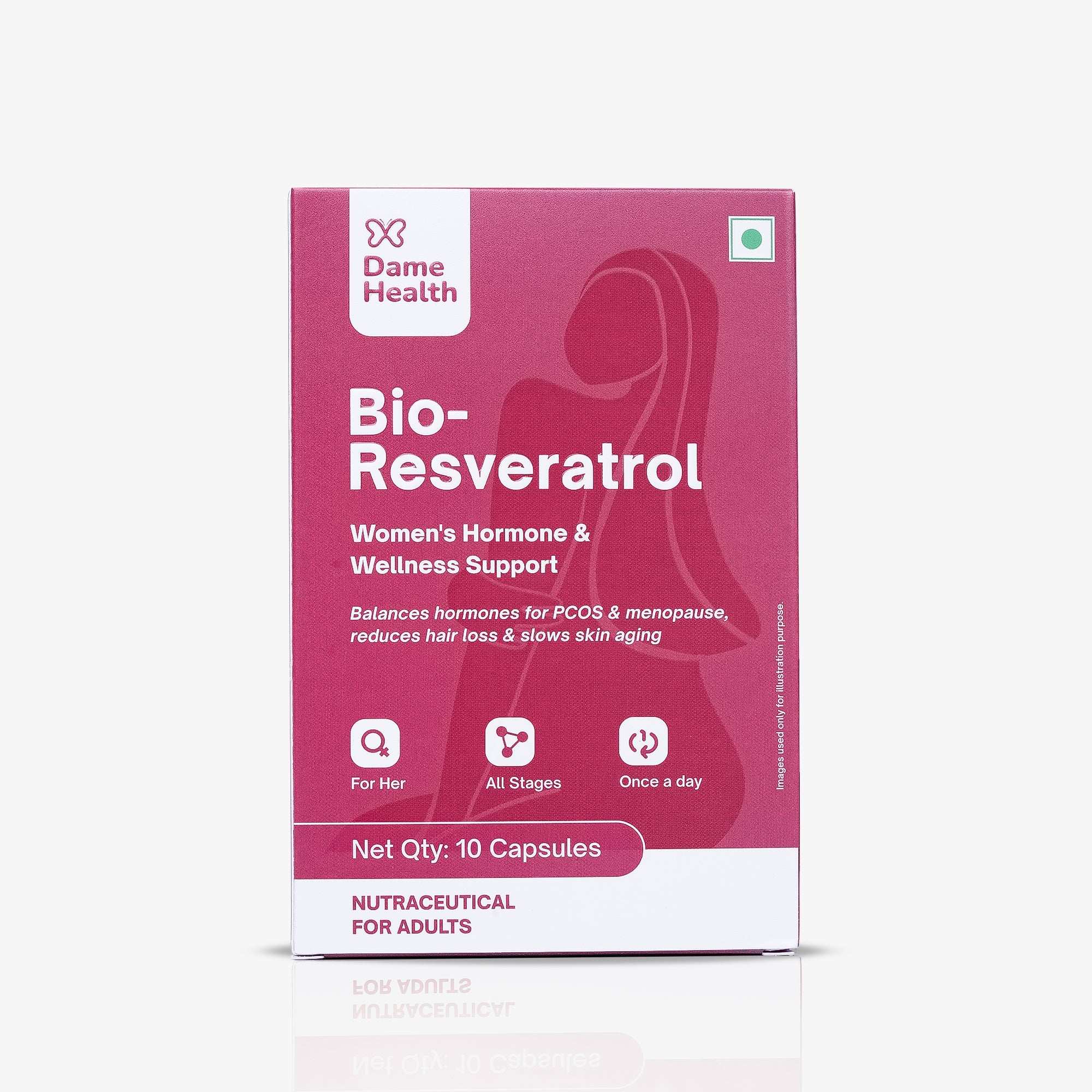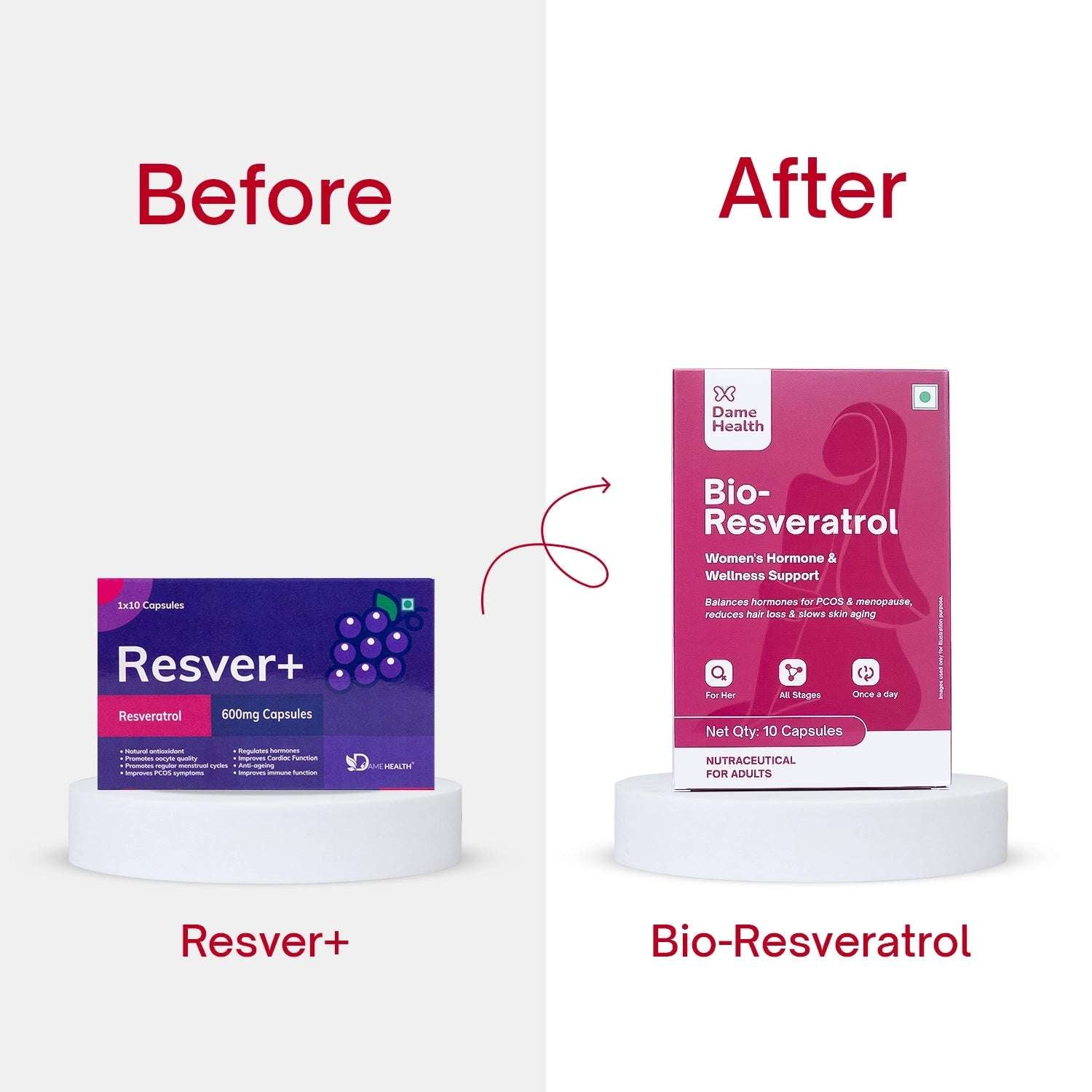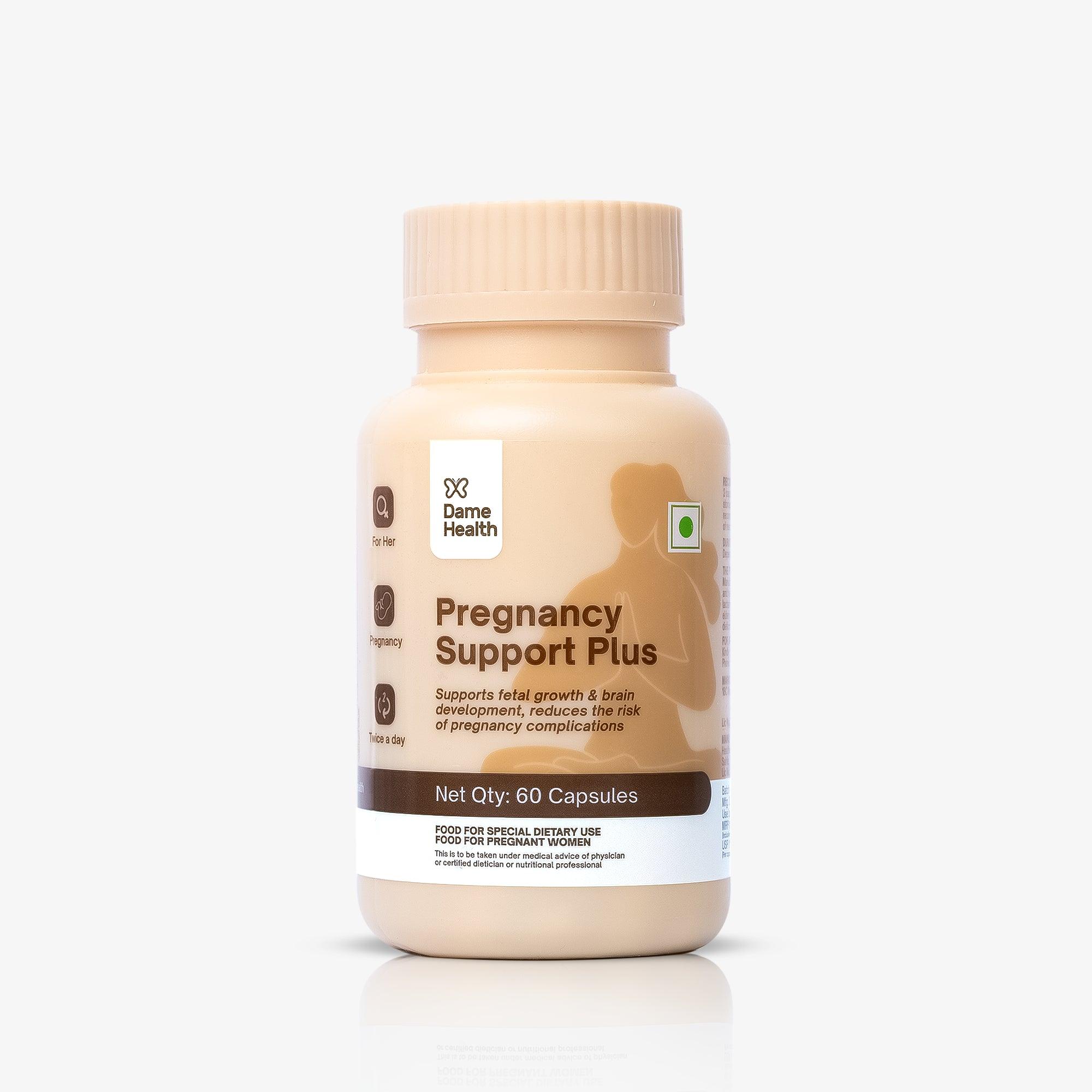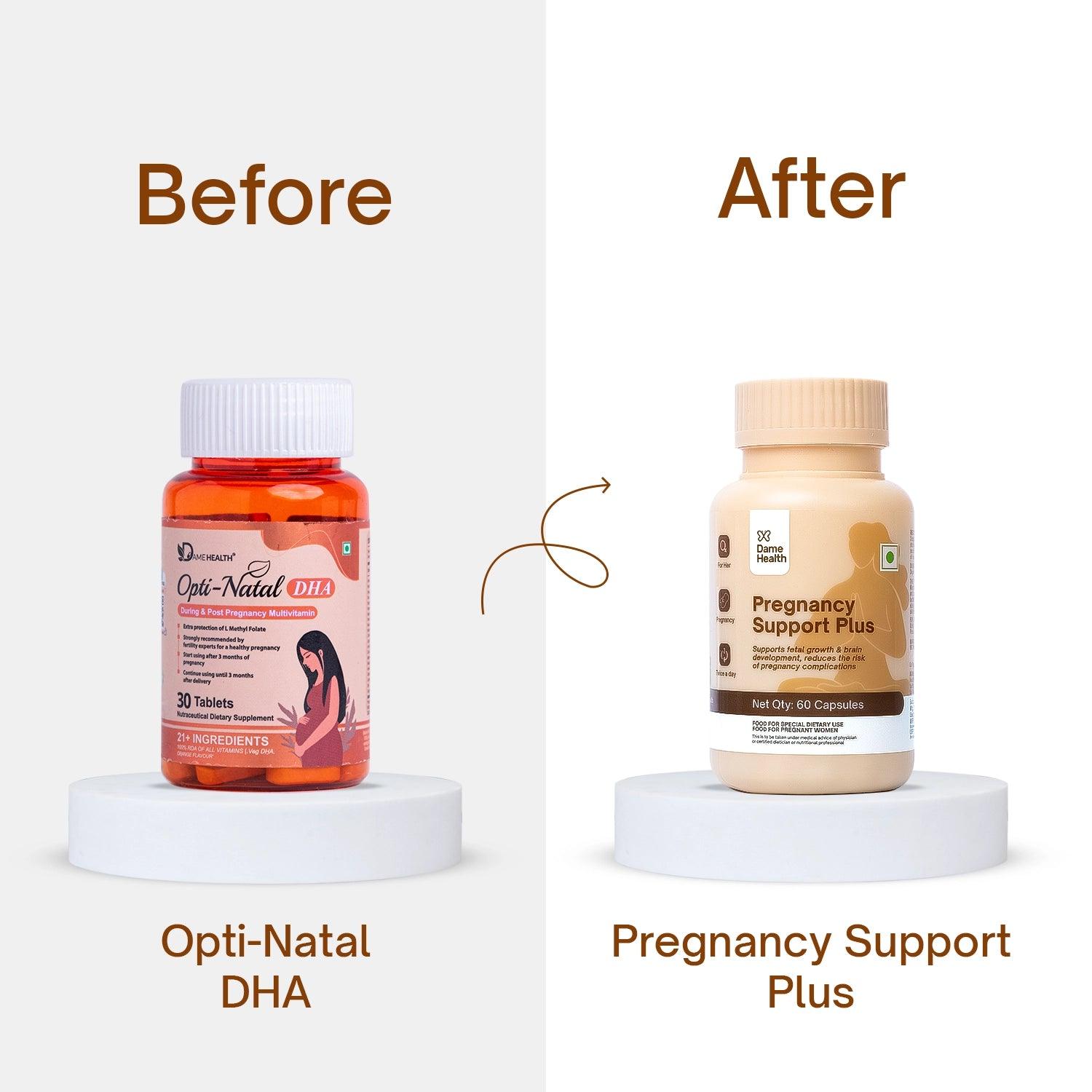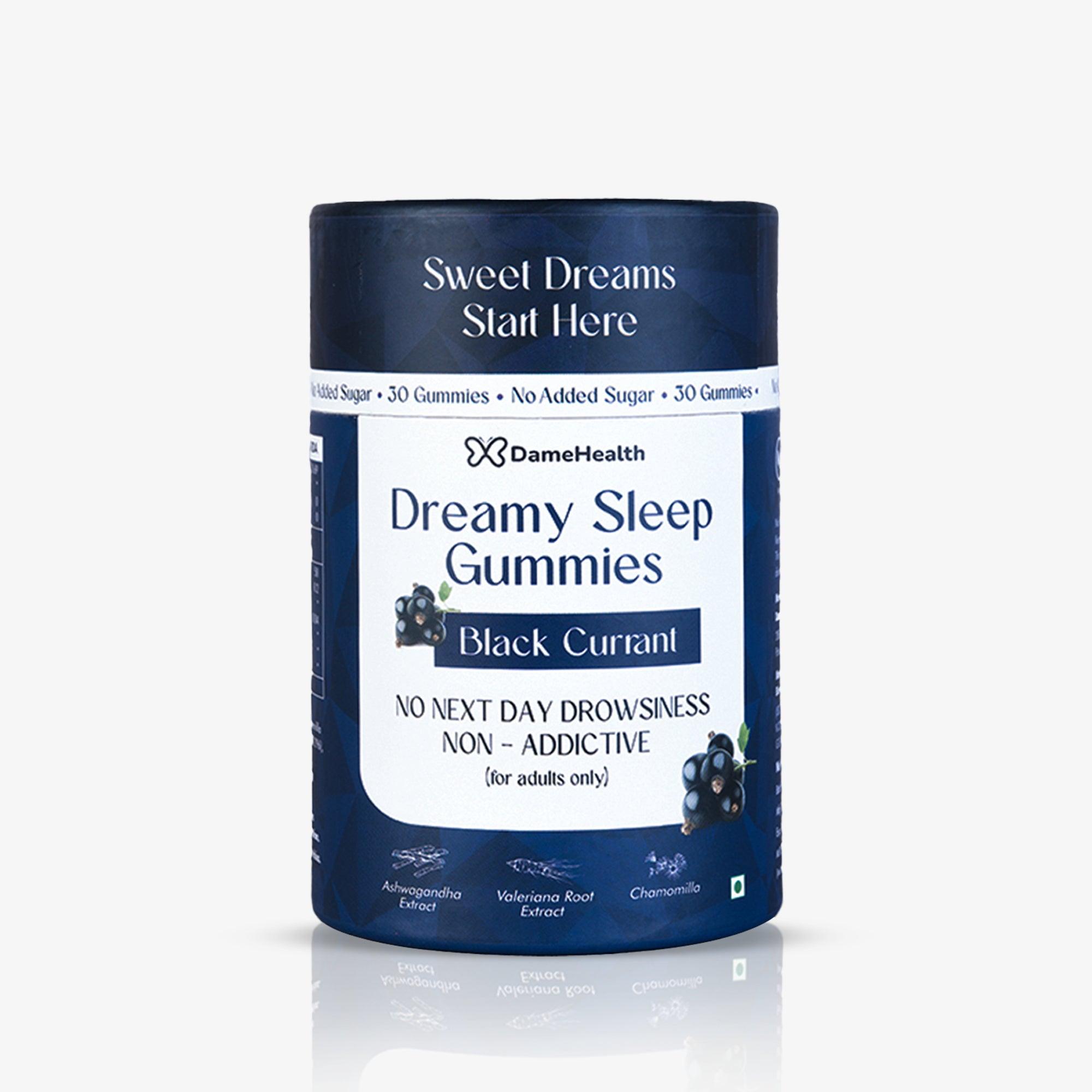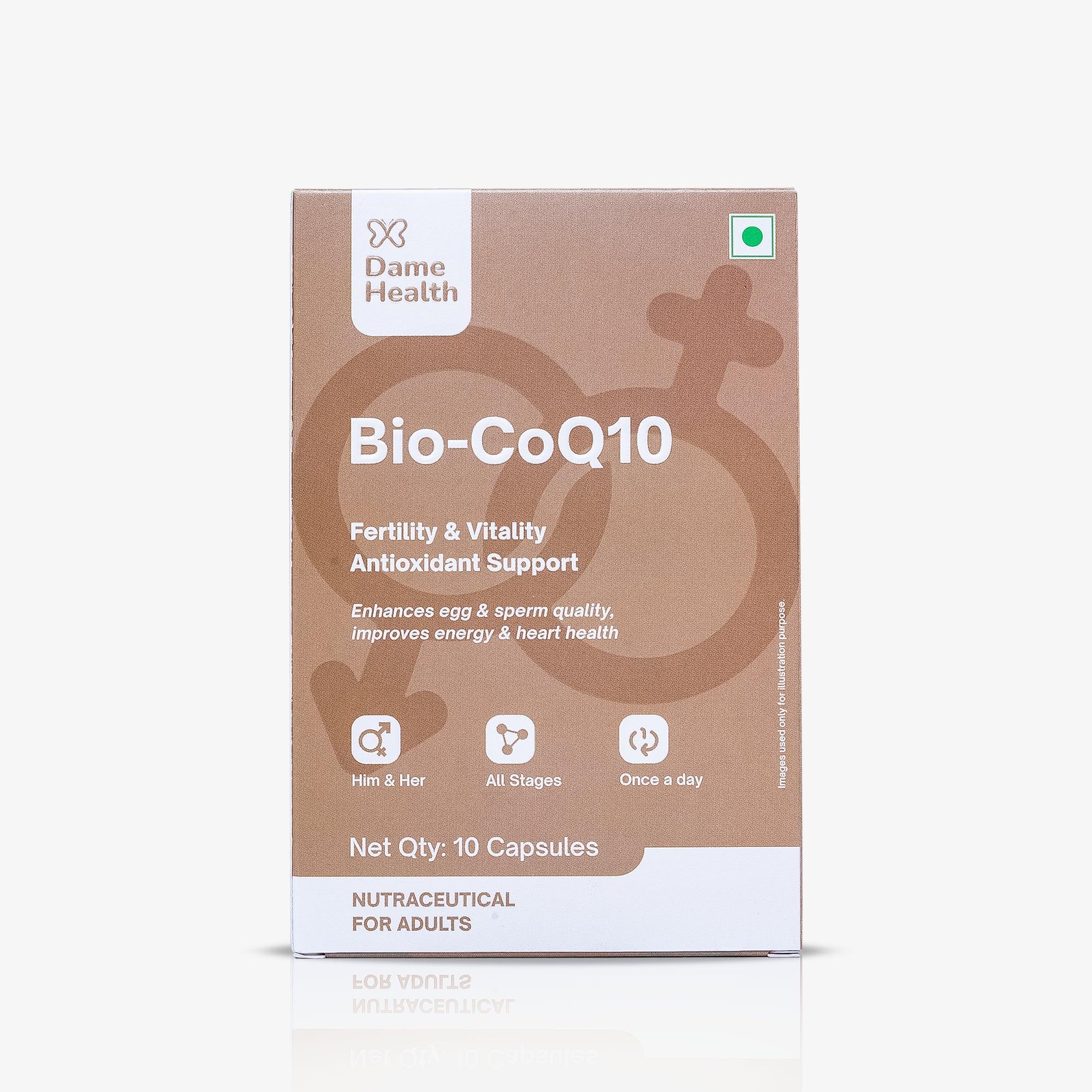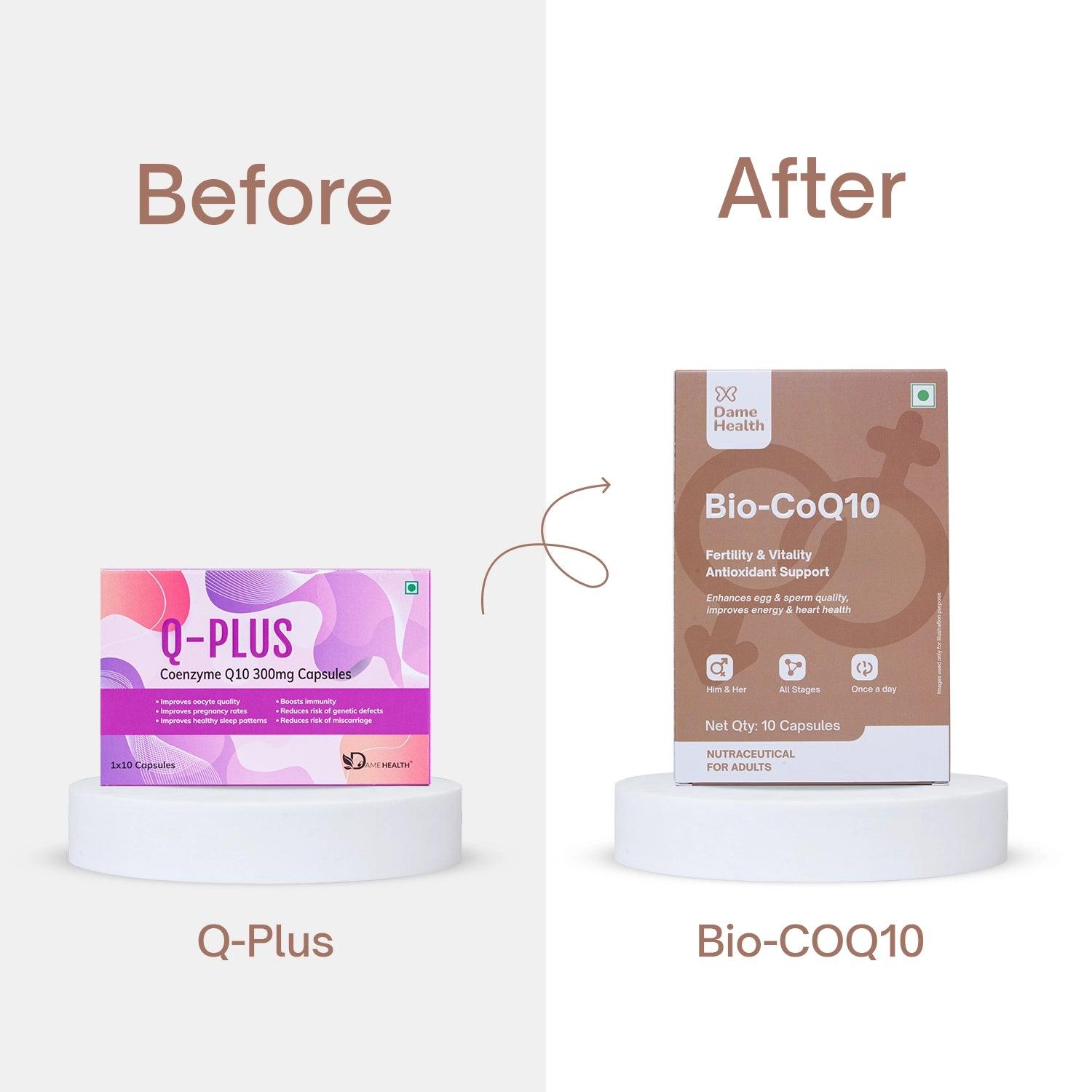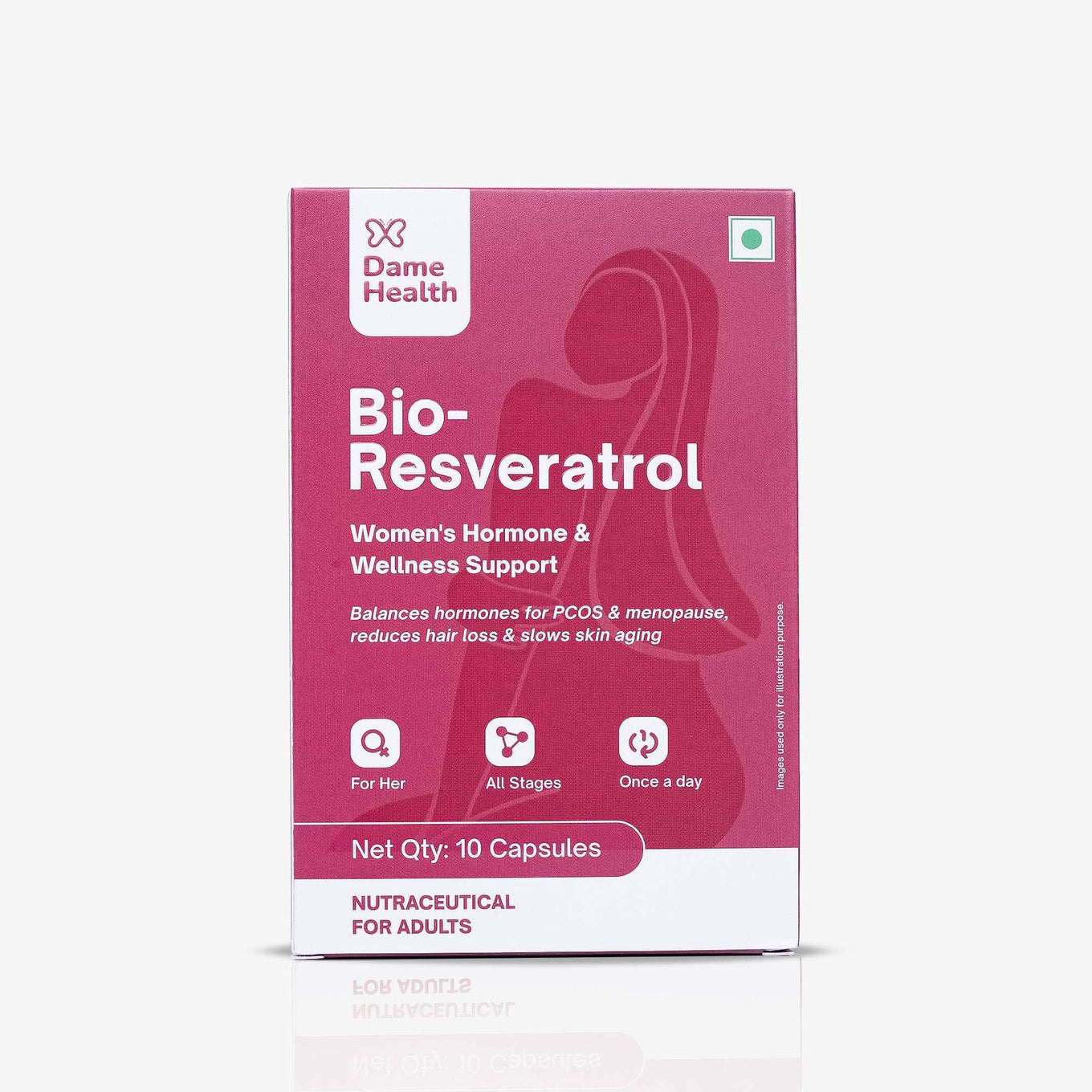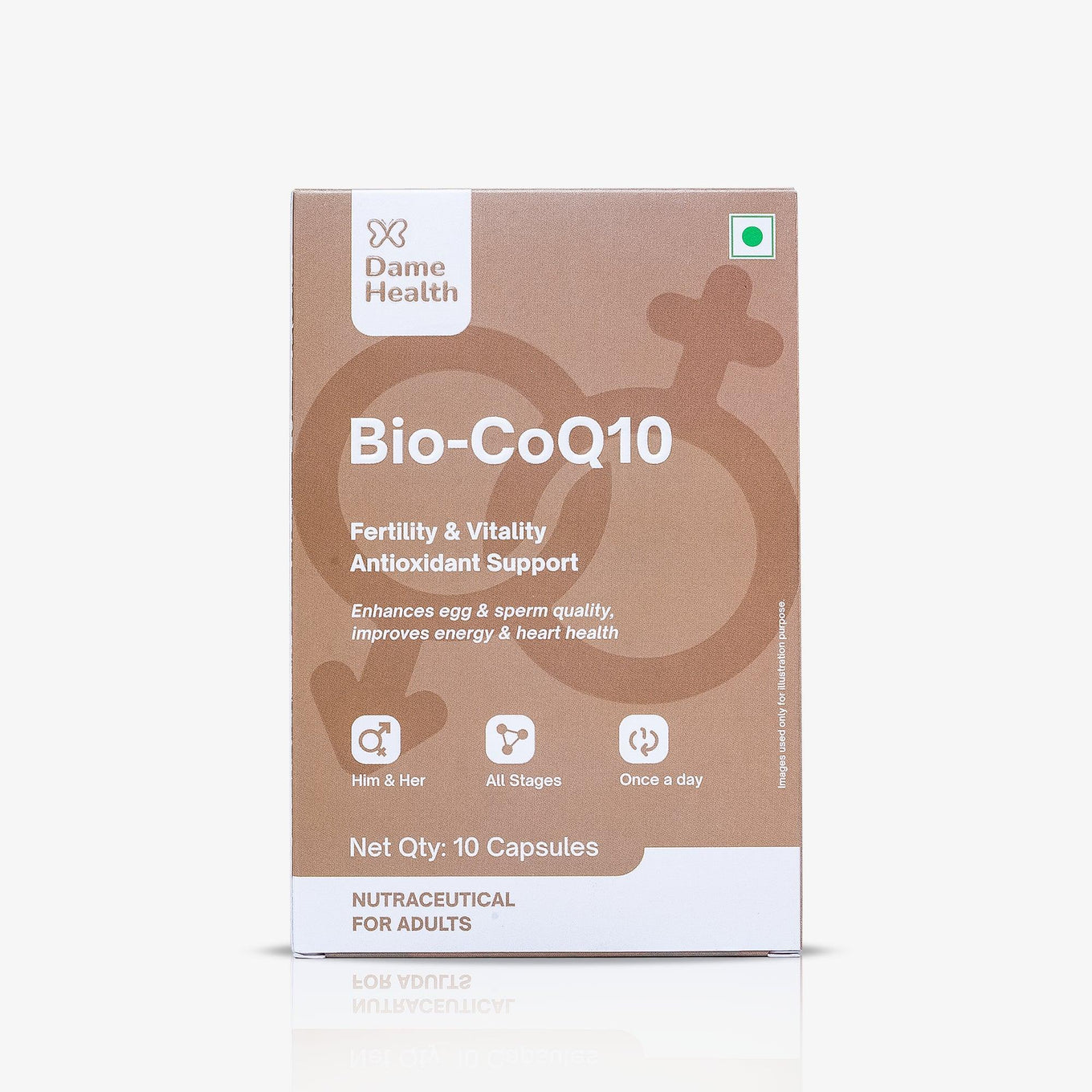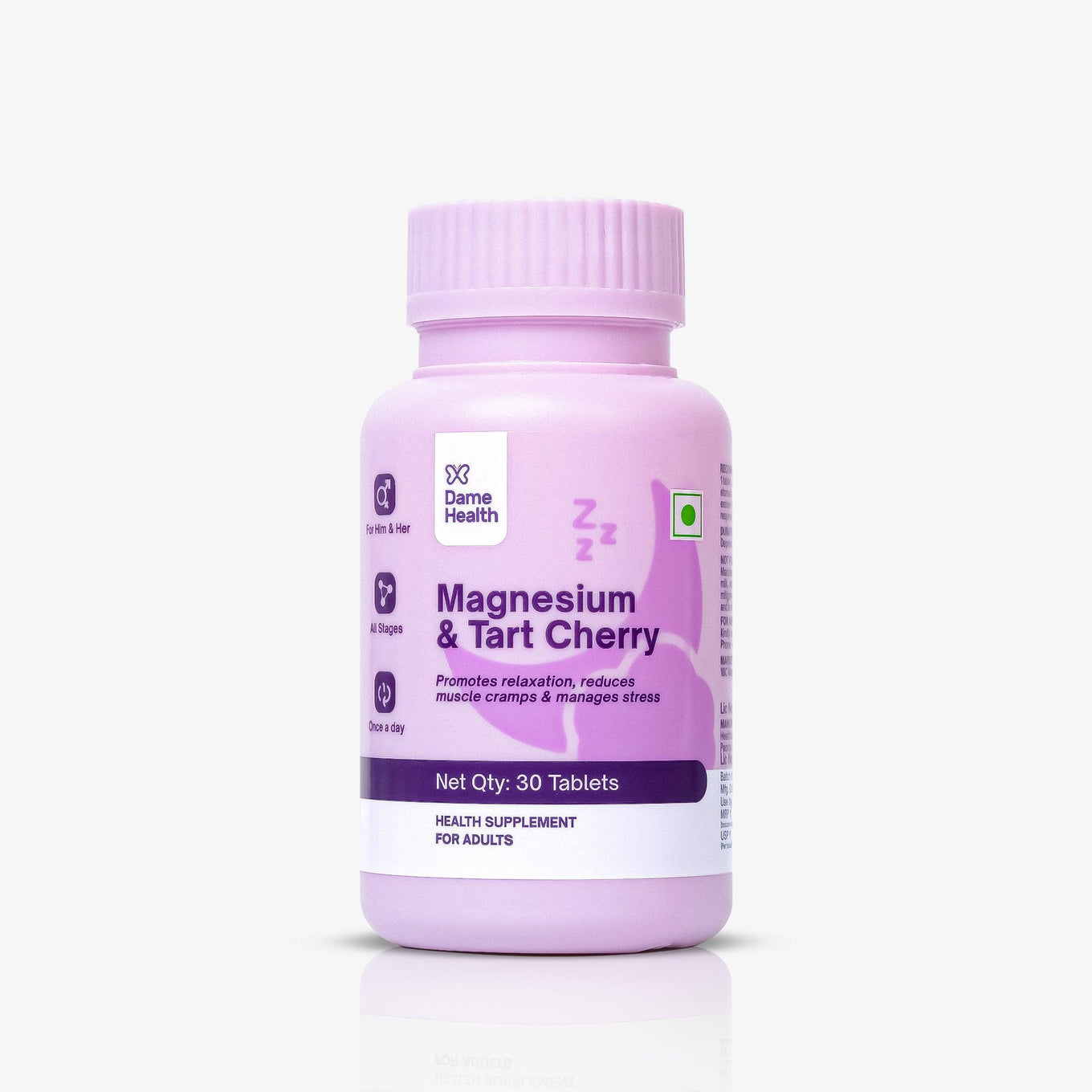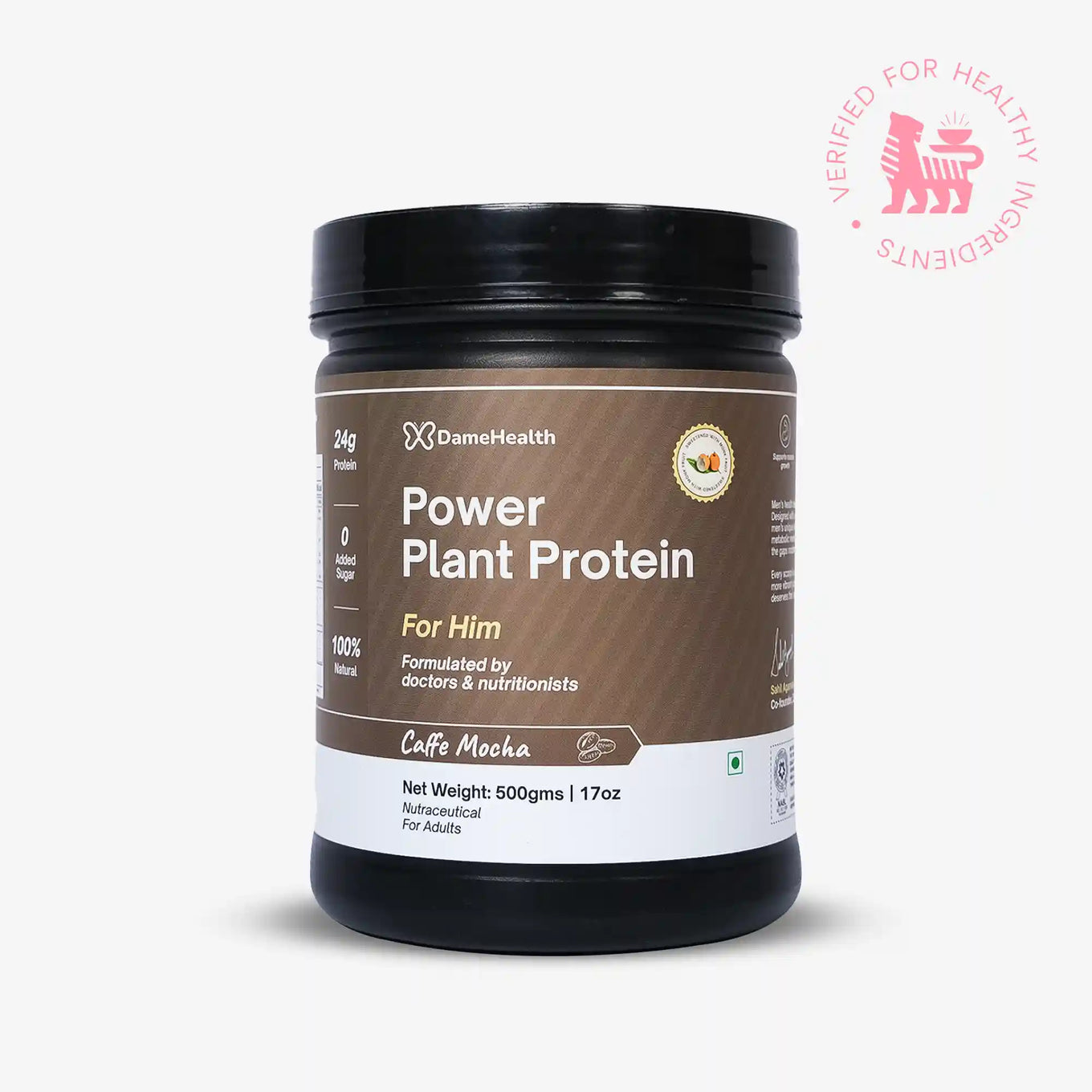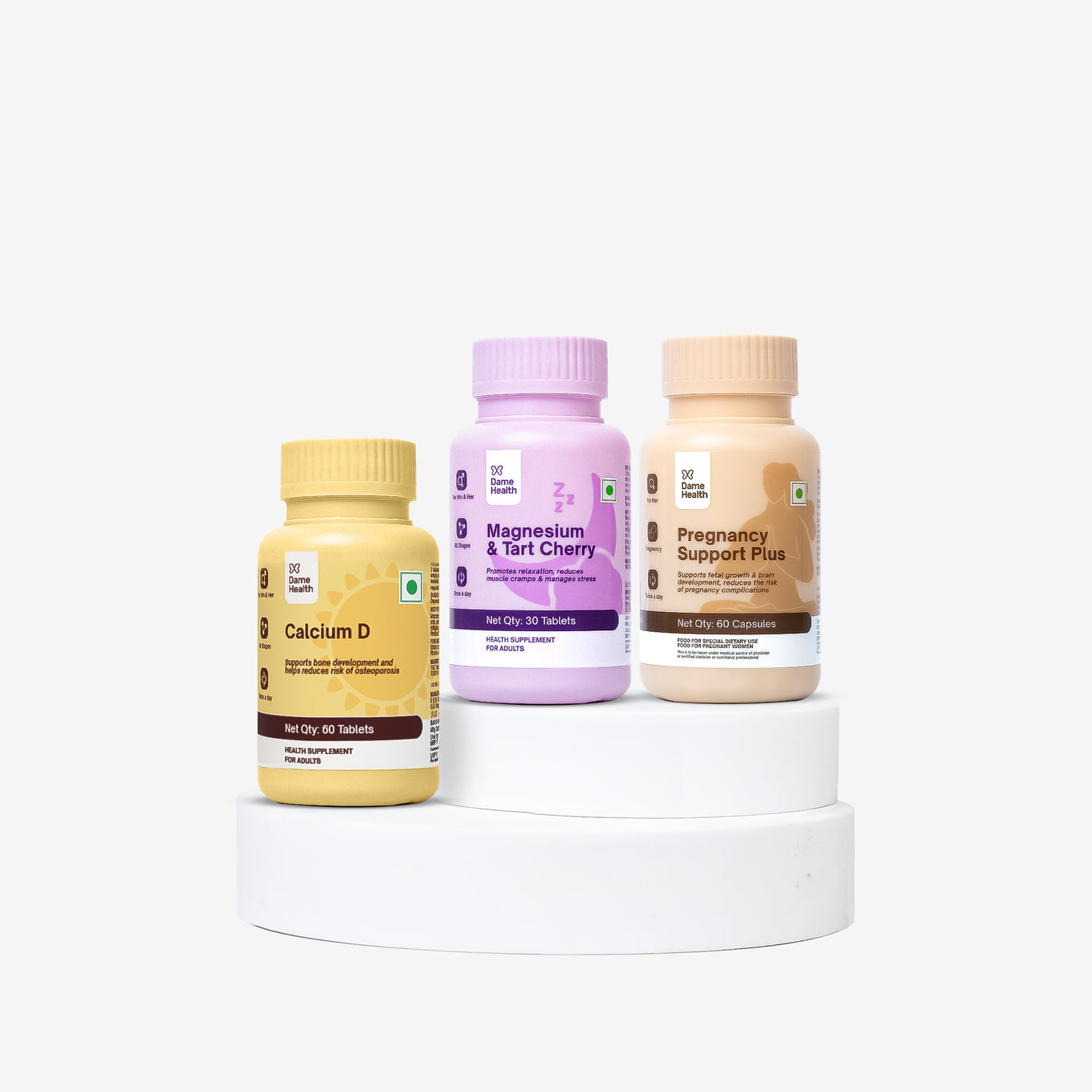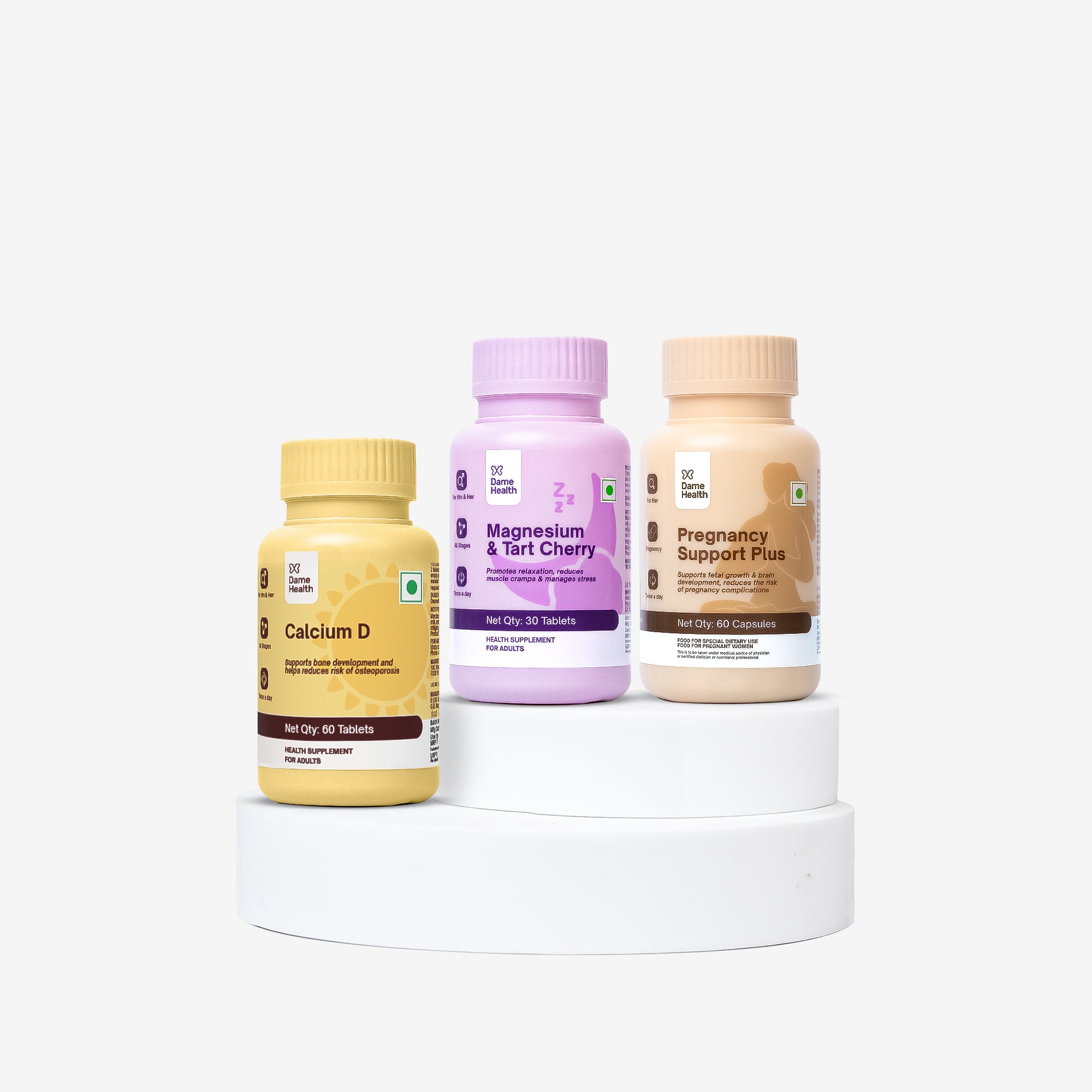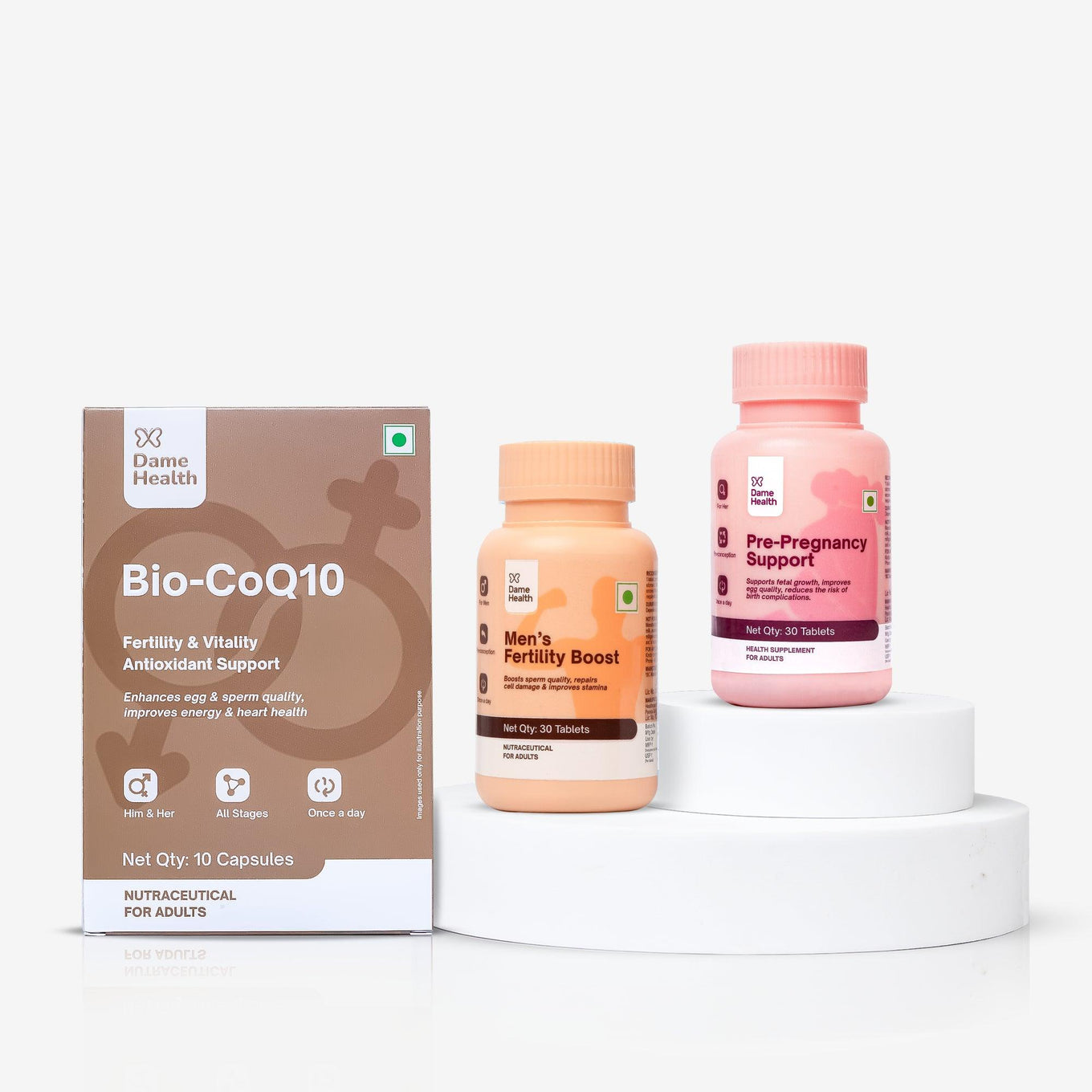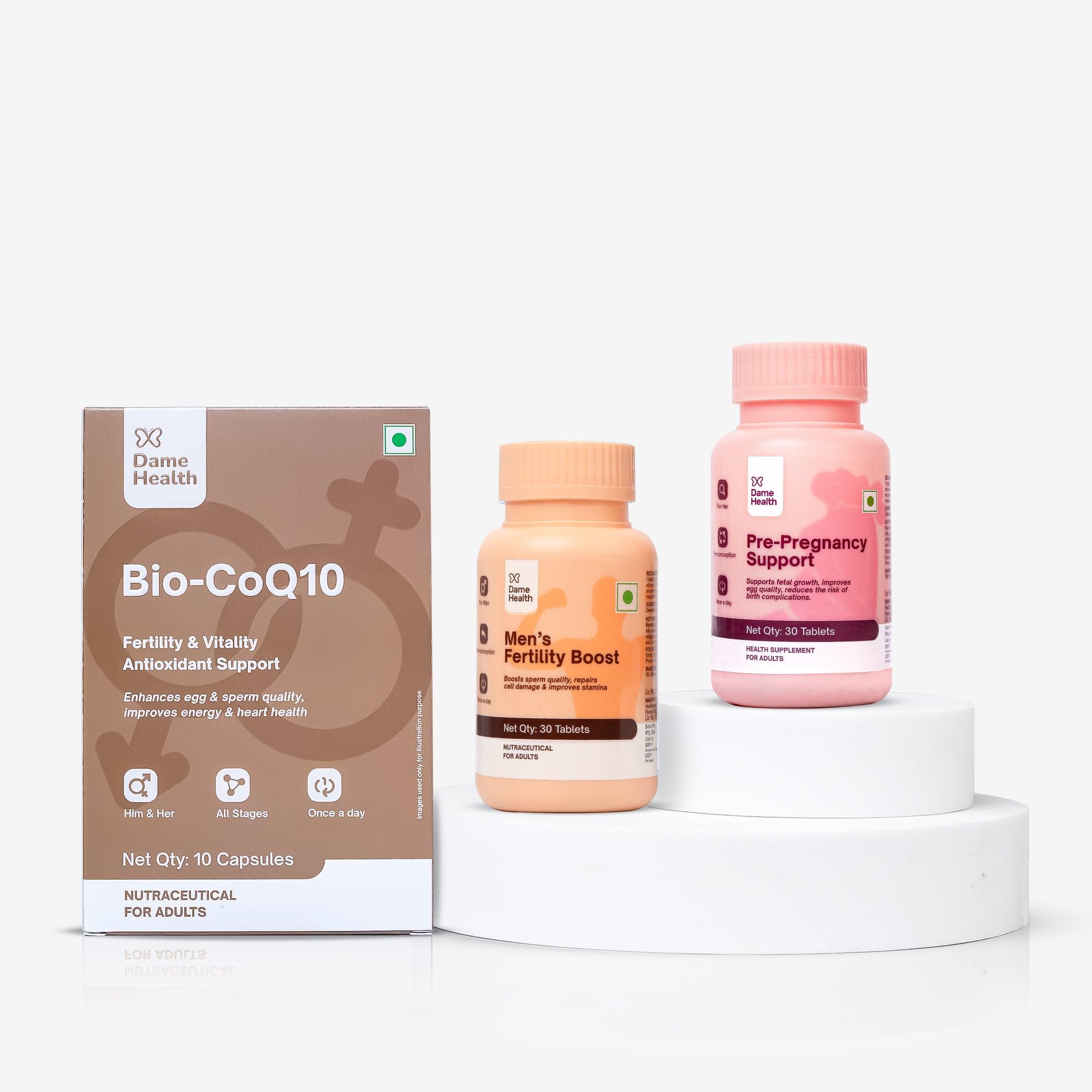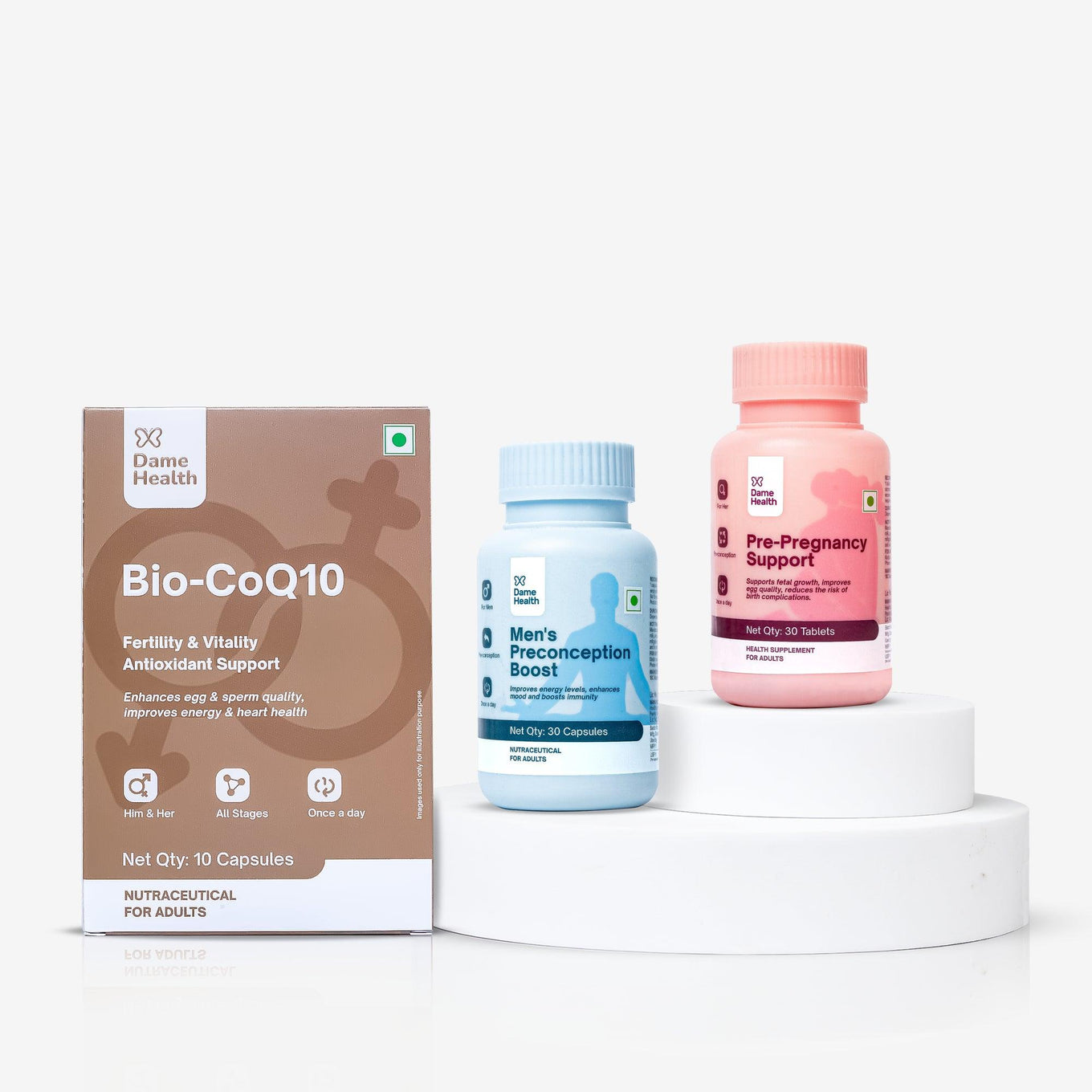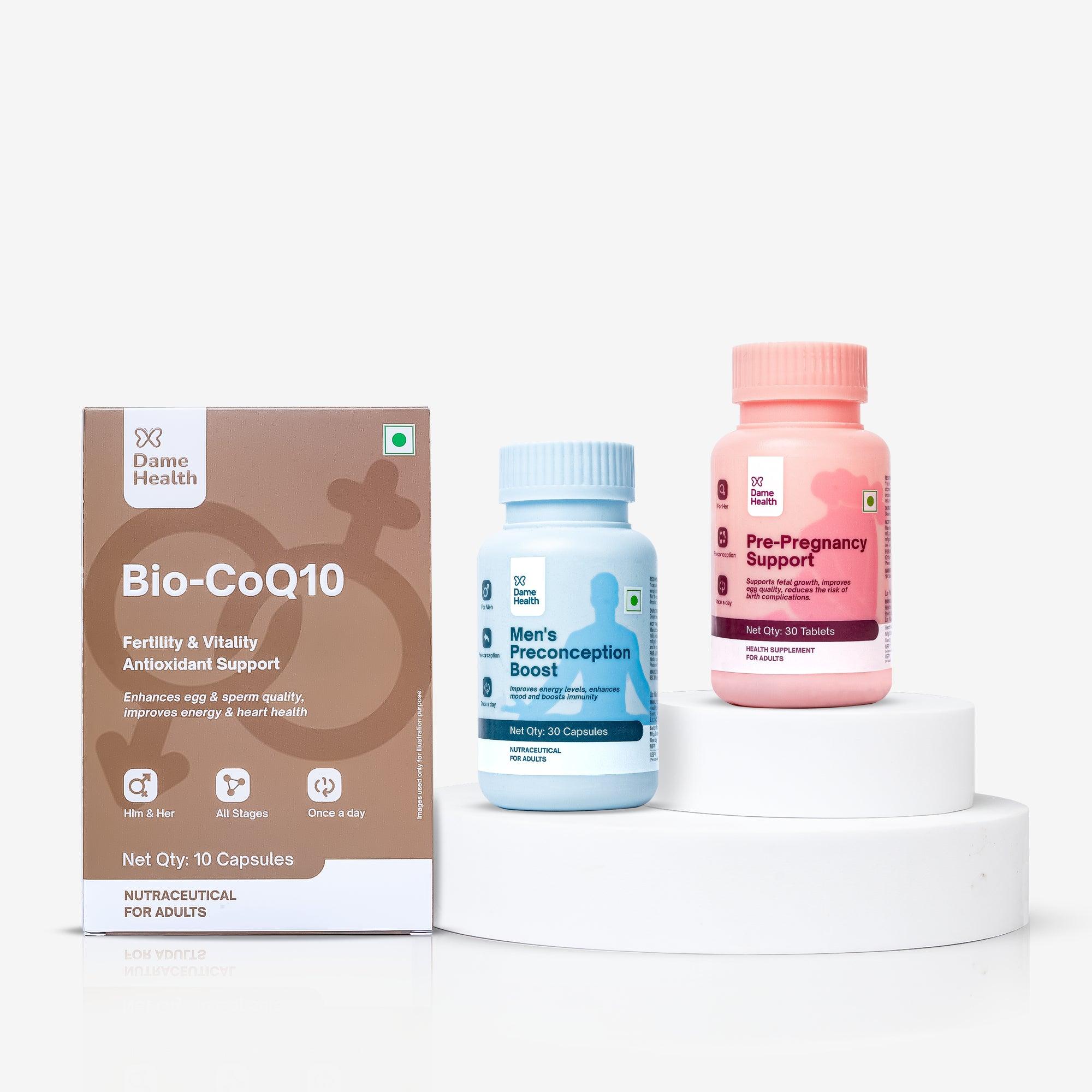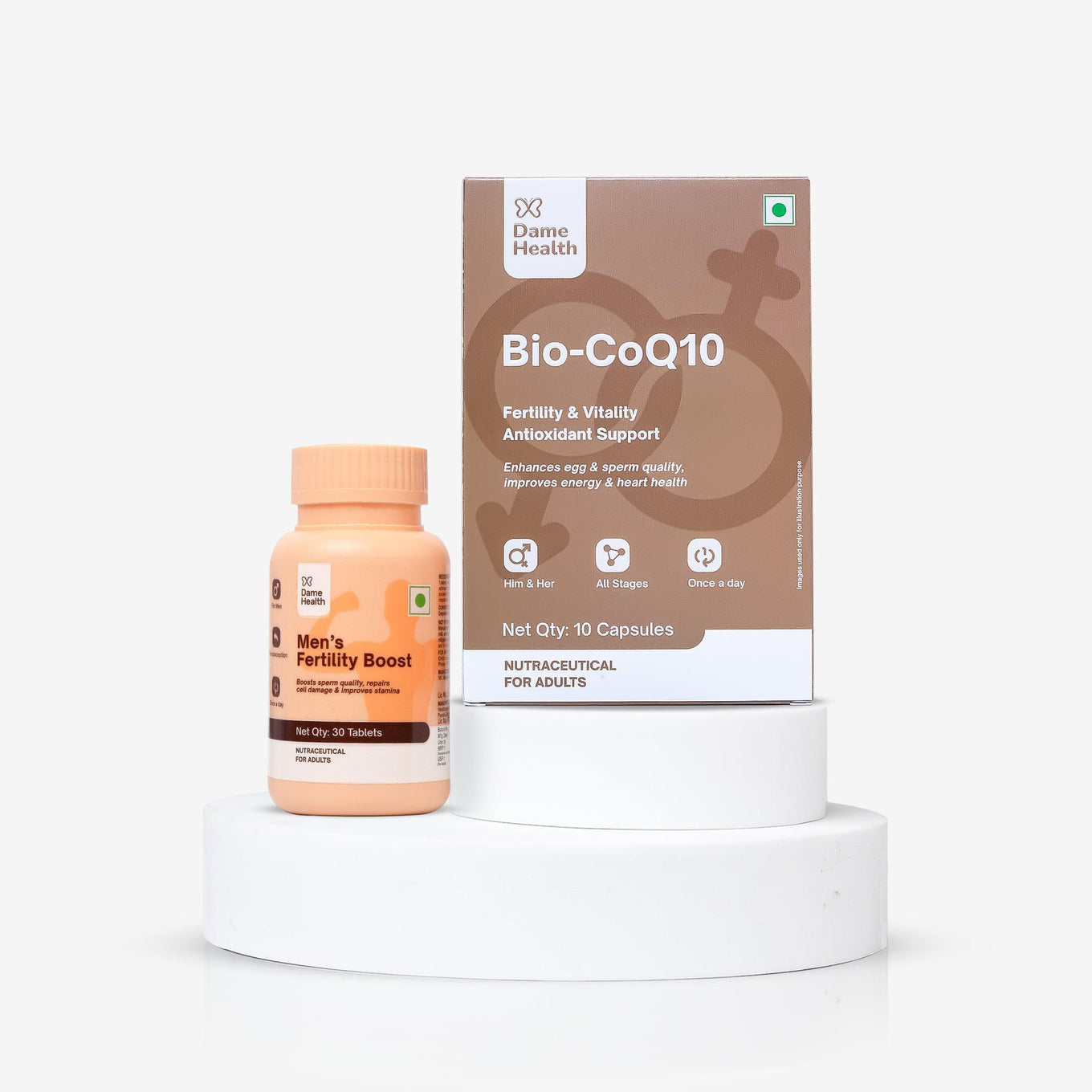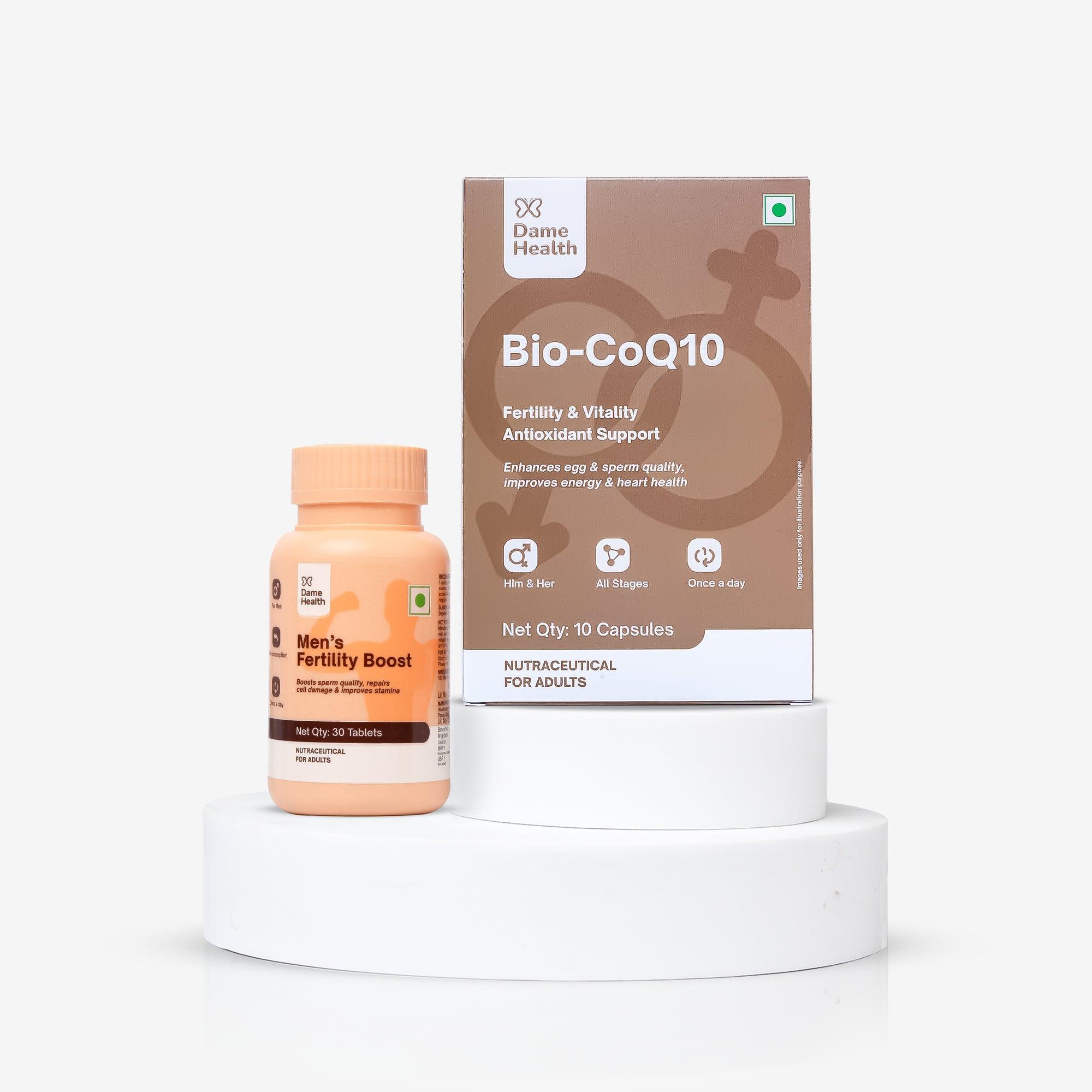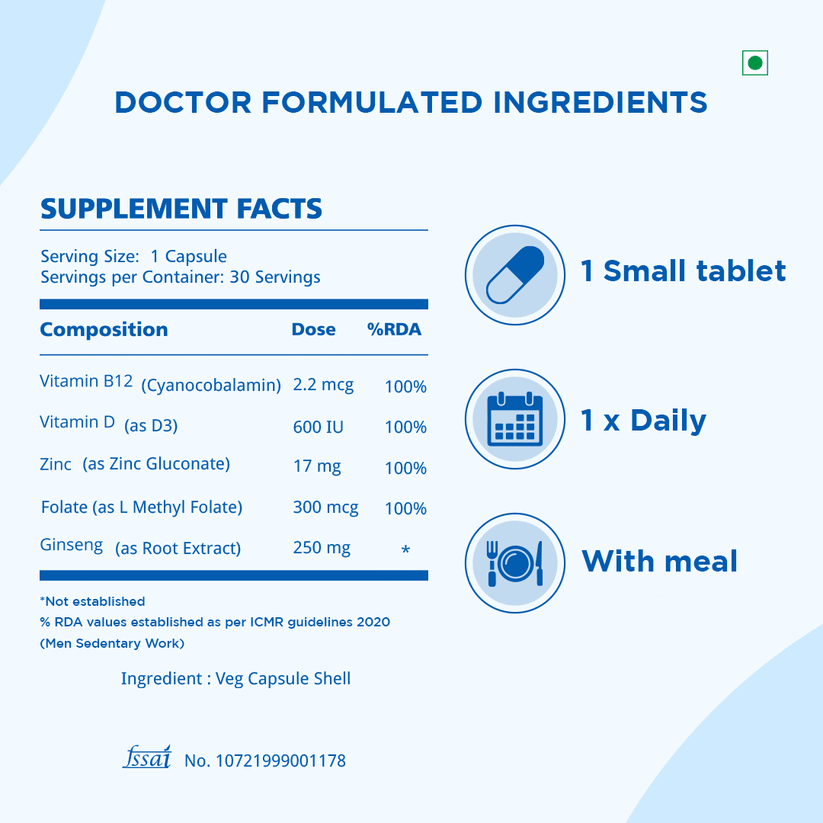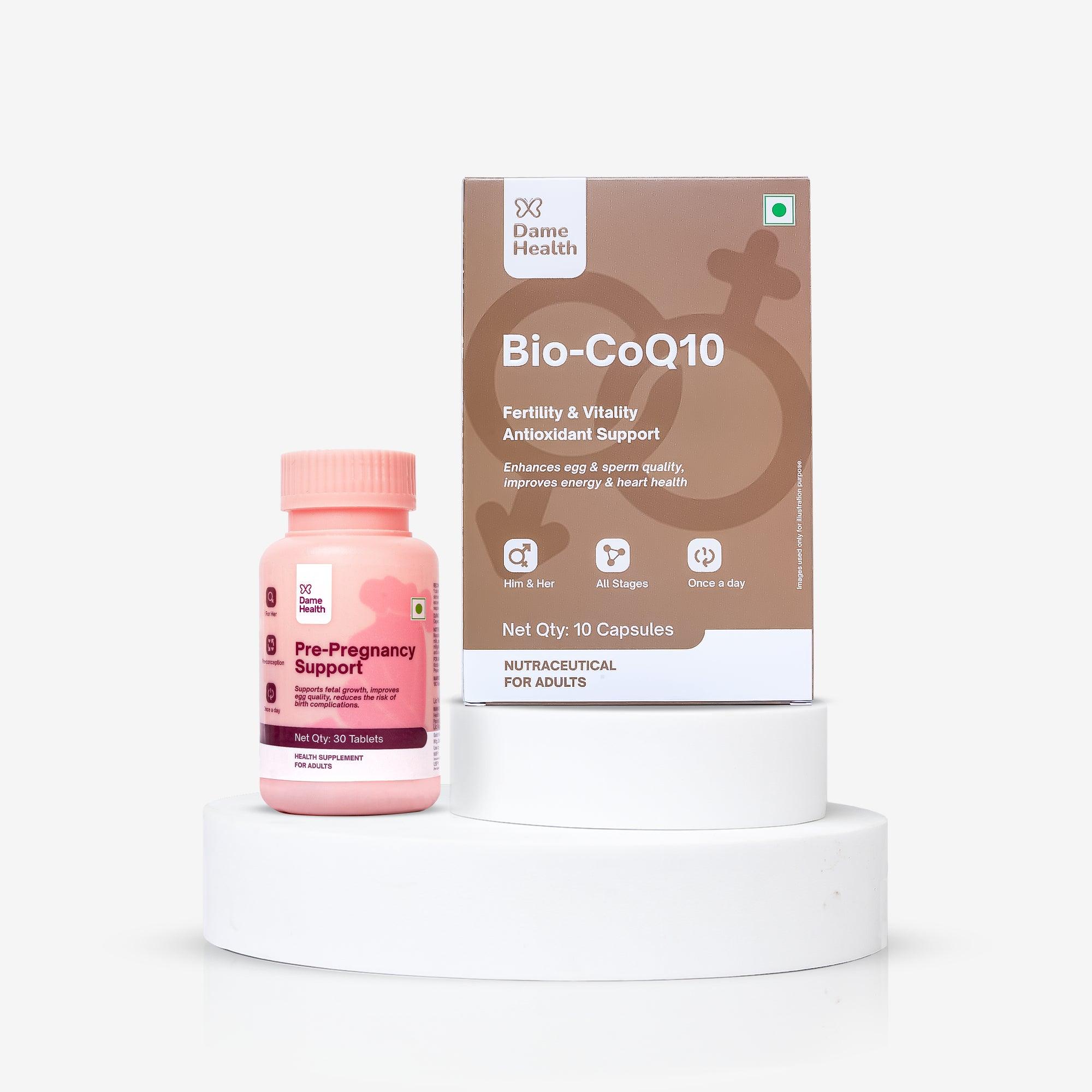Clinically backed, Expert formulated supplements
for you, Made by highest bio-availability
for you, Made by highest bio-availability
We’re Buzzing…
It’s all thanks to you!
Find your Wellness
 Women
Women Men
Men PCOS
PCOS Fertility
Fertility Pregnancy
Pregnancy Menopause
Menopause
Our Wellness Bestsellers
Scientifically backed solutions supporting thousands every day
Type:
Plant Protein l All Natural Protein for Women
Type:
Plant Protein l All Natural Protein for Men
Type:
Men's Fertility Boost I Men's Complete Care Multivitamin
Type:
Magnesium & Tart Cherry | Essential Multivitamin for Stress, Sleep & Muscle Health
Type:
Bio-Resveratrol | Advanced Hormonal Balance & Anti-Aging Formula
Type:
Pregnancy Support Plus I Women's Complete Prenatal Multivitamin
Type:
Dreamy Sleep Gummies
Type:
Bio-CoQ10 I Powerful Antioxidant for Men and Women
DameHealth Diaries
Real voices, real transformations!
Natural support to ease anxiety, reduce stress, and improve sleep quality.
Essential nutrients to boost energy, support recovery, and maintain overall wellness
Essential multivitamin for women to boost fertility, energy levels, and overall immunity
Taking care of each other or planning to extend your family, these are here to support your journey
The Dame Standard
Redefining Excellence, The Dame Standard Way
Health Solutions
Treatments
Leading Experts
Transparent Care
to Well-being
Find Your Perfect Plan
Targeted care, simplified for you.
Type:
Couple Preconception Plan
Type:
Women’s Fertility Bundle
Type:
Men Fertility Plan
Type:
Couple Fertility Plan
The Damehealth Story
Two Generations, One Vision — Championing Women’s Health
The Damehealth Story
Two Generations, One Vision — Championing Women’s Health
What happens when a father-son duo puts their heads together? They create DameHealth, a brand that’s all about turning awkward health convos into empowering wellness solutions. With dad’s wisdom and son’s passion, they’ve built a space where women’s health gets the love, care, and (of course) humor it deserves. Because who knew family talks could lead to something this game-changing?

What happens when a father-son duo puts their heads together? They create DameHealth, a brand that’s all about turning awkward health convos into empowering wellness solutions. With dad’s wisdom and son’s passion, they’ve built a space where women’s health gets the love, care, and (of course) humor it deserves. Because who knew family talks could lead to something this game-changing?
Meet the Brains Behind the Science
They’ve Got the Degrees, We’ve Got the Feels!

Dr. Apoorva Reddy

Priyanka Goenka

Dr. Mahima Lalwani

Dr. Rajeev Agarwal

Dr. Niranjana Jayakrishna

Talk to Our Health Gurus
What Sets Dame Apart?
Scientifically backed solutions supporting thousands every day






Insights from our blog!
Male & Female Preconception Health: A Shared Responsibility
Table of Contents: Why Shared Preconception Health Matters The Role of Men's Health in Fertility Women’s Preconception Needs Integrating Couple-Centric Nutrition Evidence-Based Lifestyle Actions for Couples How Supplements Can Help Couples Breaking Myths and Building Awareness FAQs Preconception care has traditionally focused on women—but science, society, and outcomes all say it’s time for a shift. Men and women alike share the responsibility for ensuring a healthy start to any pregnancy. From nutrition and lifestyle to targeted supplements, both partners play a pivotal role. Why Shared Preconception Health Matters Preconception care includes interventions that identify and modify risks before conception, aiming for better outcomes for women, babies, and families Source. Extending this care to men isn't just equitable—it’s effective. Research argues that preconception care for men improves reproductive justice and outcomes, easing the burden often placed solely on women. In fact, engaging men more holistically supports healthier pregnancies and long‑term family health. The Role of Men's Health in Fertility Semen quality is crucial to fertility. Antioxidant supplementation—such as CoQ10, vitamin C, E, zinc, and selenium—has been shown to enhance sperm motility, morphology, and reduce DNA fragmentation. Moreover, lifestyle and dietary factors matter. Diets rich in fish, whole foods, and omega‑3s improve semen parameters; whereas processed meats, sugary drinks, and obesity can contribute to poorer sperm quality. Women’s Preconception Needs For women, preconception care optimizes maternal health to support fertilization, reduce complications, and improve outcomes. It typically includes risk assessments, micronutrient optimization (e.g., folate), lifestyle changes, and vaccinations. Yet, many still lack awareness or access—highlighting the need for broader societal education. Integrating Couple-Centric Nutrition Nutrition and supplements that support both partners offer a wise approach to preconception health. DameHealth bridges this gap effectively with two premium bundles: Couple Protein Bundle: Delivers clean, plant-based protein for both men and women—offering balanced support and daily nutrition. Couple Pre-Conception Bundle: A blended regimen combining fertility-specific multivitamins for women and antioxidants for men. Each supplement supports healthy gamete formation, DNA integrity, and general vitality. These bundles underscore coverage for pair-focused interventions as recommended by evolving clinical standards. Evidence-Based Lifestyle Actions for Couples For Men: Reduce oxidative stress with antioxidants (CoQ10, iron, vitamin C), as shown to improve semen quality. Adopt a Mediterranean-style diet, rich in fruits, vegetables, fish, and healthy fats—consistently linked to higher semen quality. Limit alcohol, quit smoking, manage BMI, and reduce exposure to heat or toxins (e.g. endocrine disruptors)—all associated with sperm decline. For Women: Begin preconception counseling early (3–6 months before pregnancy). This includes folate supplementation, vaccination checks, and lifestyle screening. Incorporate prenatal multivitamins with folate, iron, choline, and DHA—for fetal neural tube development and maternal health. Match lifestyle changes with male partners—shared diet, reduced stress, and supportive routines amplify success. How Supplements Can Help Couples The shared burden of preconception care demands strategic supplementation: Couple Protein Bundle ensures consistent, daily complete protein intake—supporting recovery, metabolic health, and hormonal balance. Couple Fertility Plan aligns with male and female fertility needs: Women: prenatal nutrients like folate, iron, and DHA support egg quality and uterine environment. Men: antioxidants and micronutrients target sperm health and DNA protection. This holistic approach matches emerging guidance that emphasizes couple-based preconception strategies—not siloed gender-specific ones. Breaking Myths and Building Awareness Myth: Preconception health is only a woman’s responsibility. Reality: Male health contributes up to 50% of pregnancy success—ignoring it hinders outcomes. Myth: Supplements aren’t necessary if diets are healthy. Reality: Even well-balanced diets may lack key nutrients when needs are elevated pre-conception; supplements offer reliable nutrition. Myth: Preconception care is inconvenient. Reality: Simple changes—like couple meal planning and shared supplements—create efficient, meaningful impact. FAQs Q1. How long before conceiving should couples start preconception care? Ideally at least 3–4 months before trying to conceive, allowing time for gamete maturation and nutritional adjustments. Q2. What supplements are best for fertility? Look for folate, B-vitamins, omega‑3 DHA, CoQ10, selenium, zinc, and antioxidants—preferably third-party tested. Q3. Why is men's preconception care important? Improved sperm quality, reproductive equity, and shared planning lead to better outcomes for both partners Preconception care is no longer just a woman's domain—it’s a shared journey. By embracing couple-focused health, nutrition, and supplementation, both partners strengthen their chances of a healthy conception, pregnancy, and family. Well-formulated products like DameHealth’s Couple Protein Bundle and Couple Pre-Conception (Fertility Plan) facilitate this journey—with clean, thoughtful support for both men and women.
Learn morePregnancy & Postpartum: Is Plant Protein Safe for New Moms?
Table of Contents: Why Protein Matters in Pregnancy and Postpartum Plant Protein vs Animal Protein: What’s the Difference? Is Plant Protein Safe During Pregnancy? Key Nutrients to Pair With Protein for New Moms Practical Ways to Add Plant Protein FAQs The journey into motherhood is both beautiful and demanding. During pregnancy and postpartum, your body works harder than ever—nourishing new life, recovering from childbirth, and adjusting to hormonal changes. Nutrition plays a vital role in this phase, and one common question arises: Is plant protein safe for new moms? The answer is yes—but with some important considerations. Let’s break it down. Why Protein Matters in Pregnancy and Postpartum Protein is the building block of life. For mothers, it supports: Fetal growth & development: Especially important for brain, muscle, and tissue formation. Placental health: Adequate protein ensures proper nutrient transfer. Maternal recovery: Postpartum, protein aids tissue repair, wound healing, and milk production. Energy & resilience: Helps balance blood sugar, reduce fatigue, and support hormone regulation. The Recommended Dietary Allowance (RDA) increases during pregnancy and lactation. According to the research, protein requirements rise from 0.8 g/kg/day to 1.1 g/kg/day during pregnancy and up to 1.3 g/kg/day while breastfeeding. Plant Protein vs Animal Protein: What’s the Difference? Traditionally, animal sources like eggs, dairy, chicken, and fish have been favored for protein. However, plant protein powders and supplements have become popular—especially for women seeking lighter, cleaner, and easier-to-digest options. Benefits of Plant Protein Easier digestion: Many moms report less bloating compared to whey protein. Naturally rich in fiber & phytonutrients. Lower in allergens: Dairy-free and lactose-free, ideal for sensitive stomachs. Supports heart health: Often paired with lower fat and cholesterol content. Points to Watch Amino acid profile: Some single-source plant proteins (like rice protein) lack certain essential amino acids. Blends or enriched powders solve this. Additives & sweeteners: Some plant powders add artificial flavors—check labels carefully, especially during pregnancy. Is Plant Protein Safe During Pregnancy? Yes, plant protein is considered safe if it: Comes from clean, tested sources Has a complete amino acid profile Contains no heavy metals or harmful fillers Studies show that plant-based diets during pregnancy—when balanced—can provide sufficient protein and nutrients. Supplements can bridge gaps if daily intake from food isn’t enough. Postpartum Nutrition: Why Plant Protein Fits Well After delivery, the body undergoes recovery while also producing milk (if breastfeeding). Protein demands increase, but appetite, time, and energy may decrease. This is where plant protein powders become practical: Quick meal replacement: Smoothies or shakes are easy to prepare. Gentle on digestion: Less likely to cause stomach upset during a sensitive phase. Supports lactation: Amino acids in protein help build prolactin and other milk-regulating hormones. Key Nutrients to Pair With Protein for New Moms Protein works best when supported by other nutrients crucial during pregnancy and postpartum: Calcium & Vitamin D: For bone health and muscle function (e.g., DameHealth Calcium D). Iron & Folate: To replenish blood and prevent anemia. Magnesium: To reduce muscle cramps and support sleep (e.g., DameHealth Magnesium & Tart Cherry). Choline & DHA: For baby’s brain development (e.g., Pregnancy Support Plus). DameHealth Plant Protein: Designed for Women Unlike generic powders, DameHealth Plant Protein for Women is formulated specifically for women’s needs. It’s: Plant based & clean: Free from dairy, soy isolates, and unnecessary fillers. Complete protein blend: Pea protein isolate for all essential amino acids. Low calorie, high protein: Supports weight management postpartum without compromising nutrition. Hormone-friendly: Crafted with women’s metabolic health in mind, safe for both pregnancy and postpartum. Common Myths About Plant Protein in Pregnancy & Postpartum Myth 1: Too Much Protein Is Dangerous in Pregnancy It’s true that extreme protein intake without balancing carbs and fats isn’t advisable (the so-called “protein toxicity”). But for most women, the concern isn’t over-consumption—it’s under-consumption. Research shows that many expectant mothers fall short of the 1.1 g/kg/day recommended intake. The key is to aim for balance, not restriction. Myth 2: All Protein Powders Are Unsafe for Pregnancy Not all protein powders are created equal. Some commercial products contain artificial sweeteners, heavy metals, or unnecessary additives. However, clean, third-party tested formulations—like plant protein blends designed for women’s health—are safe when taken as part of a balanced diet. Myth 3: Plant Protein Isn’t Complete Single-source proteins can lack one or two essential amino acids. But blends or fortified plant powders solve this, delivering a complete amino acid profile comparable to animal protein. DameHealth Pure Plant Protein is one such example, designed to meet women’s unique needs. Myth 4: Protein Shakes Cause Weight Gain Postpartum Protein alone doesn’t cause weight gain—caloric surplus does. In fact, plant protein powders can support healthy postpartum weight management by increasing satiety, preserving lean muscle, and stabilizing blood sugar. For new moms with limited time, a quick shake can be a nutrient-dense option. Myth 5: Supplements Replace Real Food No supplement should be viewed as a substitute for whole foods. Instead, think of protein powders as insurance—filling gaps on days when appetite, energy, or time limit your ability to prepare balanced meals. They’re tools, not replacements. Practical Ways to Add Plant Protein Smoothies with banana, spinach, and plant protein Oats + almond butter + plant protein Protein energy bites (dates, nuts, and powder) Quick shakes for breakfast or snack Plant protein is not only safe for new moms—it can be a game-changer during pregnancy and postpartum. It supports energy, recovery, lactation, and long-term health without the digestive discomfort often linked with whey. The key is to choose clean, complete, women-focused formulas like DameHealth Plant Protein for women—so you can meet your needs while nurturing new life. FAQs Q1. Can I take plant protein while breastfeeding? Yes, provided it’s clean, free from contaminants, and designed for women’s health. Q2. How much protein do I need daily postpartum? Around 1.3 g/kg/day, depending on weight, activity, and lactation. Q3. Does plant protein help with postpartum weight management? Yes. It promotes satiety, preserves lean muscle, and supports gradual weight recovery. Q4. Should I stop other supplements if I use plant protein? No. Protein works alongside prenatal/postnatal multivitamins, calcium, magnesium, and DHA.
Learn moreDo You Really Need a Multivitamin? What Women and Men Should Know Before Choosing One
Table of Contents: The Case for Multivitamins Women’s Needs: Not Just About Pregnancy Men’s Multivitamins: The Overlooked Side Fertility Multivitamins: A Preconception Edge Food vs Supplements: Why Both Matter How to Choose Wisely Multivitamins have always sparked debate—are they essential, or just expensive pills? While a balanced diet should always be the foundation of good health, modern lifestyles and unique life stages mean supplements often have a role to play. For both women and men, multivitamins are more than “fertility boosters”—they’re tools for energy, immunity, and long-term wellness. The Case for Multivitamins The Case for Multivitamins Busy schedules, stress, food processing, and even soil nutrient depletion mean that many people fall short of their daily vitamin and mineral needs. A multivitamin acts like a safety net, ensuring the body gets consistent access to nutrients required for: Energy metabolism (B vitamins, magnesium, iron) Hormonal balance (folate, vitamin D, antioxidants) Immunity (vitamins C, D, zinc, selenium) Cognitive function (B12, omega-3s, choline) This doesn’t mean food loses its importance—multivitamins are meant to complement, not replace, a nutrient-dense diet. Women’s Needs: Not Just About Pregnancy A multivitamin for women should do more than prepare for conception. Women face unique demands, including menstrual cycles, pregnancy, postpartum recovery, and menopause. Common deficiencies include iron, folate, and vitamin D—nutrients tied directly to energy, mood, and bone strength. DameHealth’s Pregnancy Support Plus goes beyond being a prenatal multivitamin. It offers a thoughtful blend of essential vitamins, minerals, and omega-3s to support energy, hormone balance, and fetal development. But even outside pregnancy, these nutrients matter for women’s day-to-day wellbeing. Men’s Multivitamins: The Overlooked Side Men are less likely to reach for supplements, yet gaps in zinc, selenium, and magnesium are common. These nutrients support testosterone balance, sperm health, energy levels, and heart function. A multivitamin for men ensures consistent coverage. DameHealth’s Men’s Fertility Boost is a great example—it doubles as a daily male reproductive health supplement while supporting broader needs like immunity and stamina. Fertility Multivitamins: A Preconception Edge When planning a pregnancy, nutrient needs intensify. Both partners benefit from tailored support: Preconception multivitamin for women: Folate, choline, and iron support egg quality and ovulation. Multivitamin for men: Zinc, CoQ10, and antioxidants improve sperm motility and DNA integrity. DameHealth’s Pre-Pregnancy Support Multivitamin helps women prepare their bodies months before conception, while couples can explore bundled options like the Couple Preconception Plan. These are fertility multivitamins, but their reach goes far beyond reproductive health—they’re about building a nutrient foundation that benefits overall wellness. Food vs Supplements: Why Both Matter It’s true: vitamins in food are packaged with natural cofactors that enhance absorption. Leafy greens deliver folate with fiber, fatty fish brings omega-3s alongside protein. But supplements offer consistency. They cover what even the healthiest diets might miss, especially during demanding stages like preconception, pregnancy, or periods of high stress. Think of it as synergy: food builds the foundation, supplements strengthen the framework. How to Choose Wisely When shopping for a multivitamin, look for: Bioavailable forms (methylated folate, chelated minerals) Life-stage specific formulas (women’s, men’s, preconception, prenatal) Clean-label design (no unnecessary fillers or artificial additives) This is where DameHealth stands apart: clean, targeted formulations designed with both women’s and men’s unique health journeys in mind. Multivitamins aren’t magic bullets, but they are smart tools. Whether you’re optimizing fertility, balancing hormones, or simply trying to feel more energized, they provide an added layer of support. DameHealth’s multivitamin range—from fertility blends to daily wellness support—proves one thing: health isn’t just about covering today’s needs, it’s about preparing for every stage of life.
Learn more- Choosing a selection results in a full page refresh.
- Opens in a new window.


